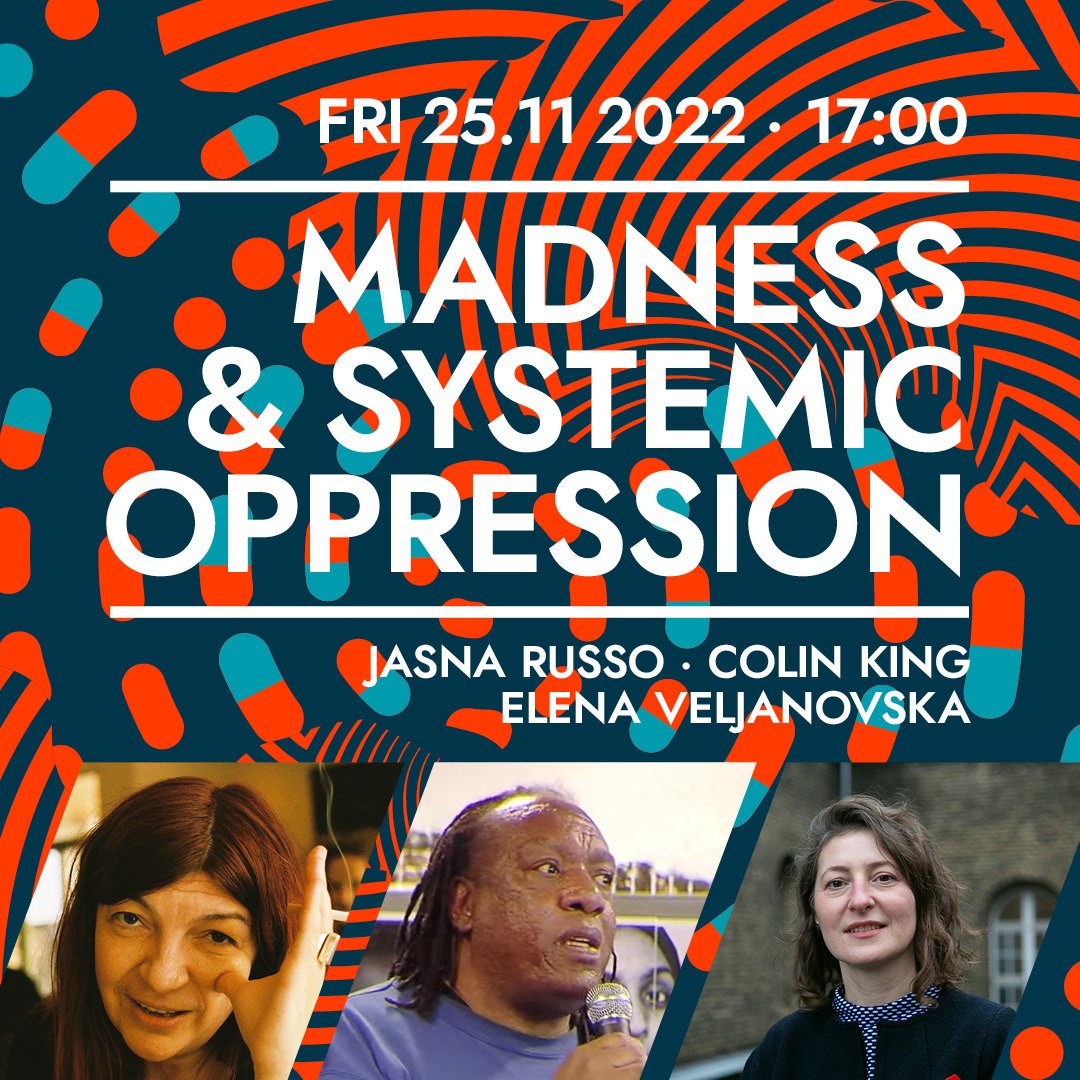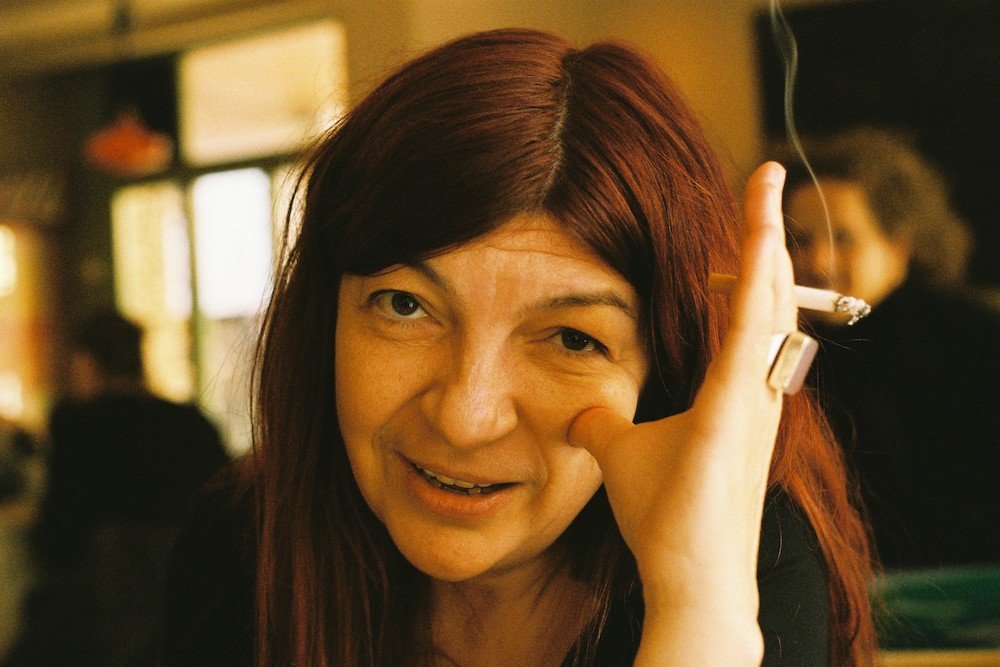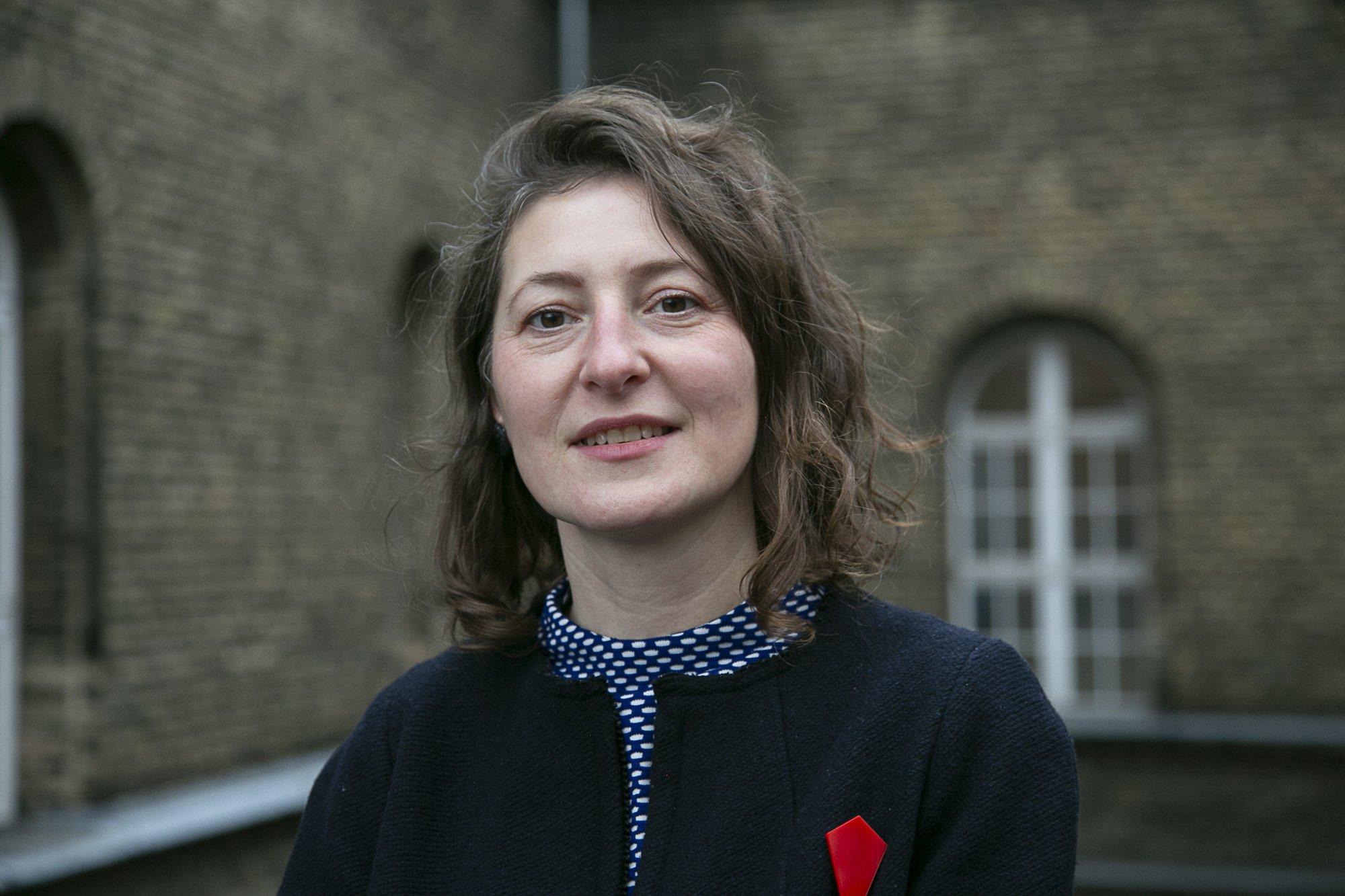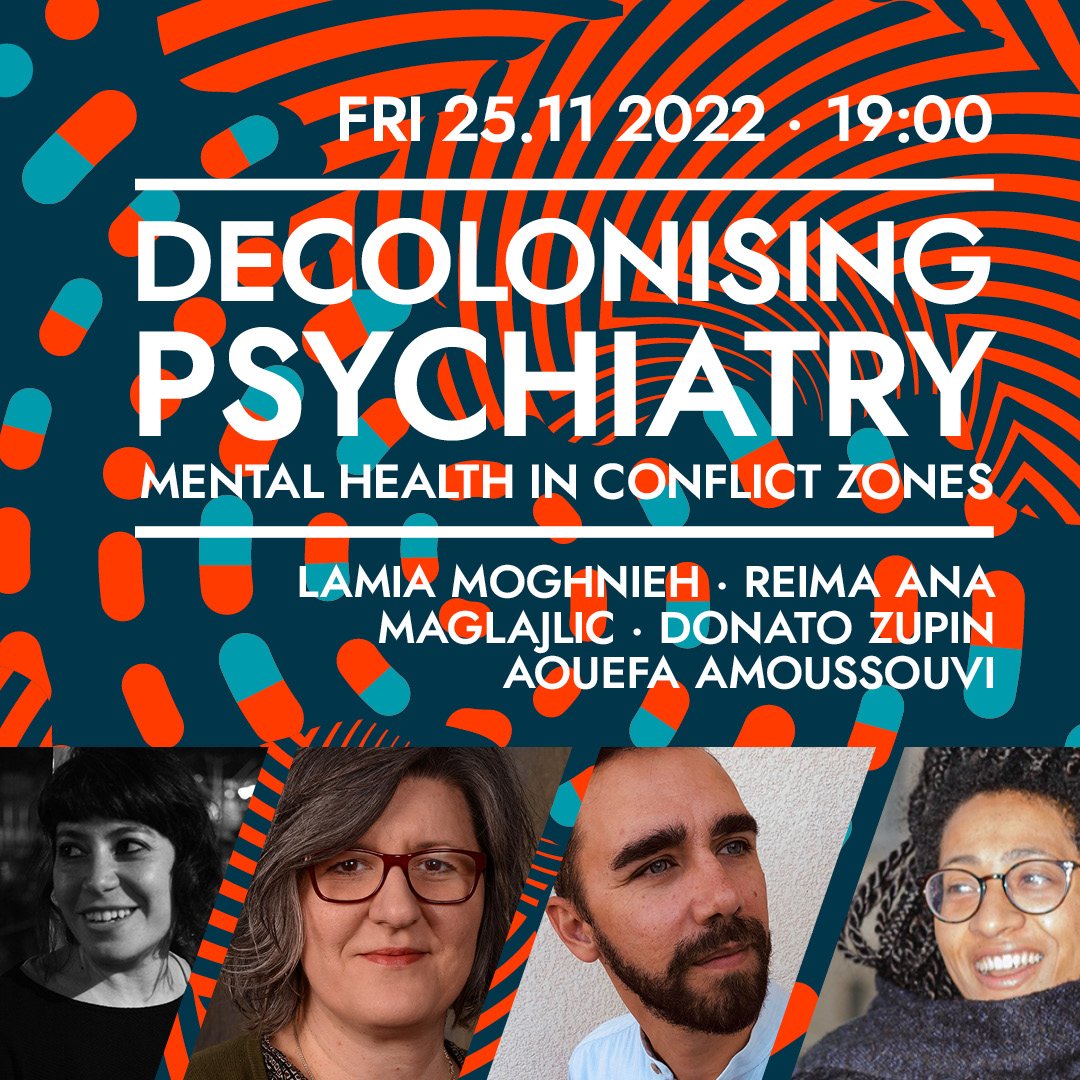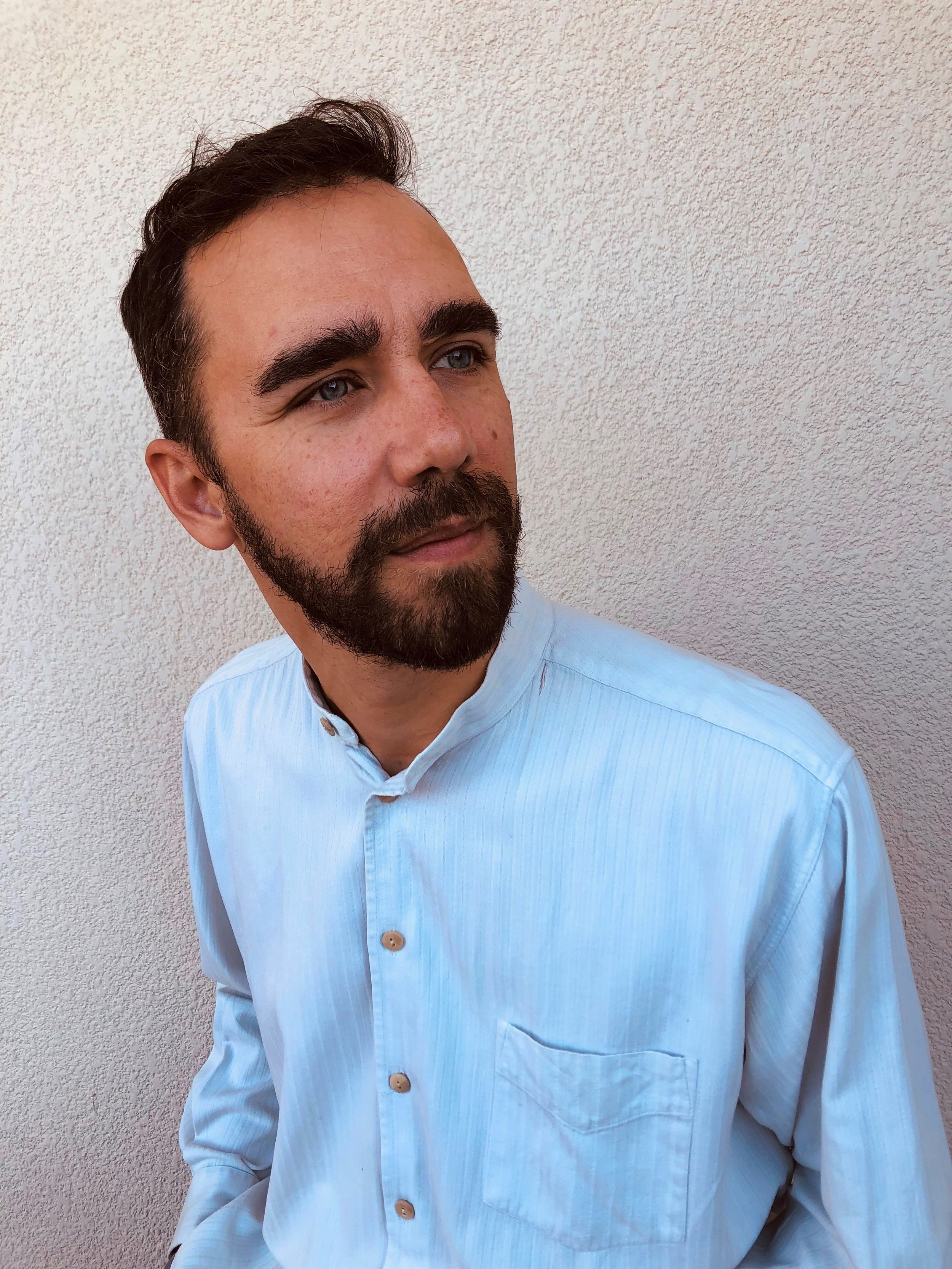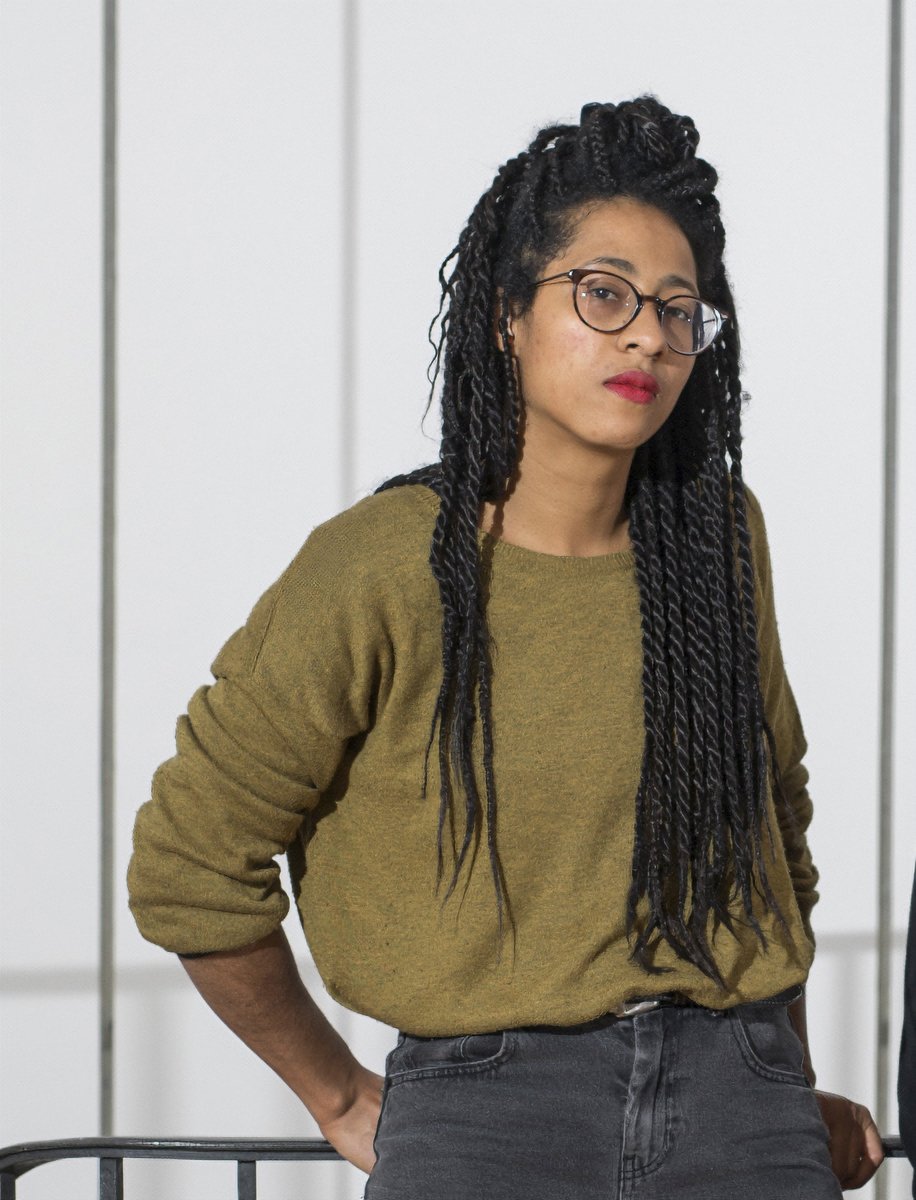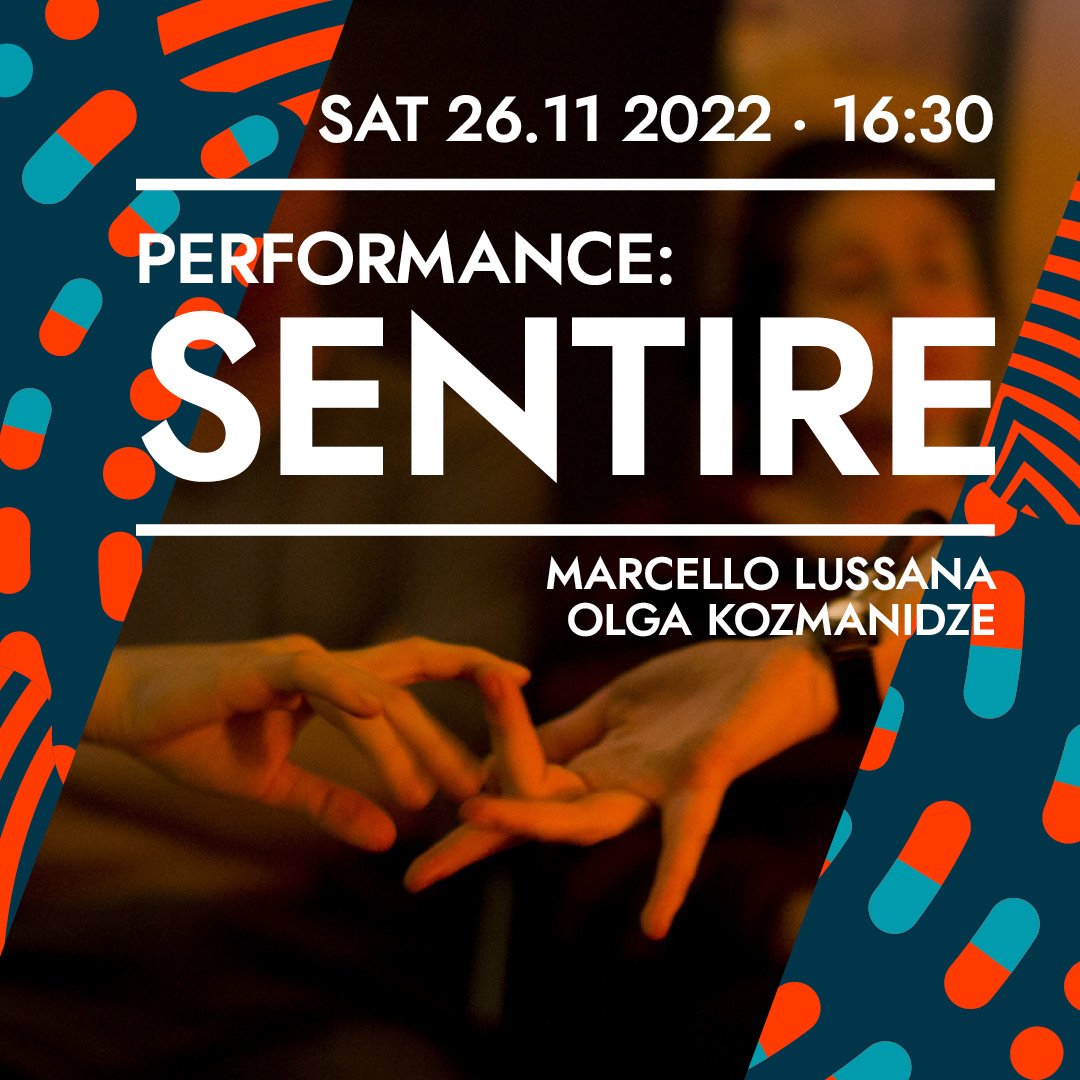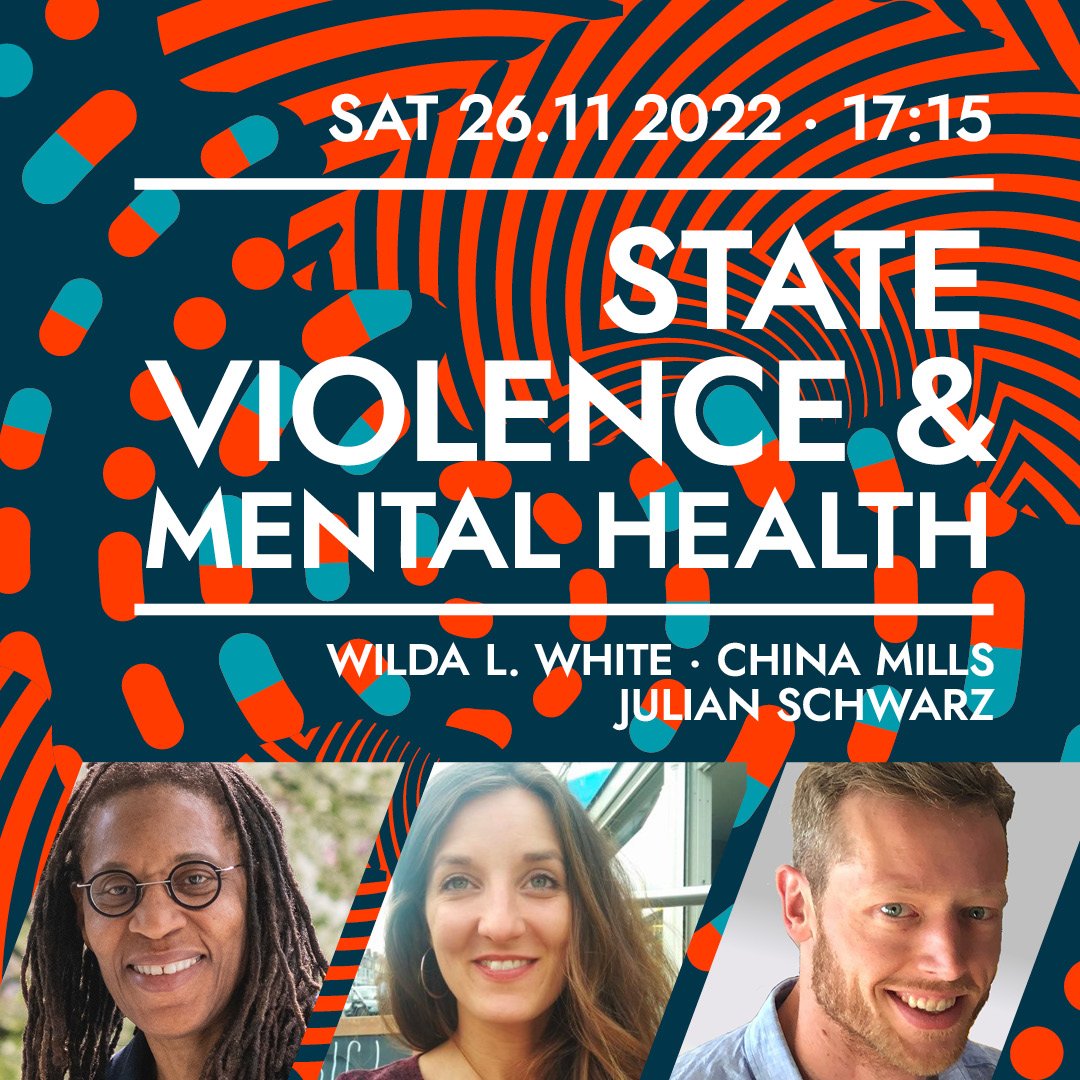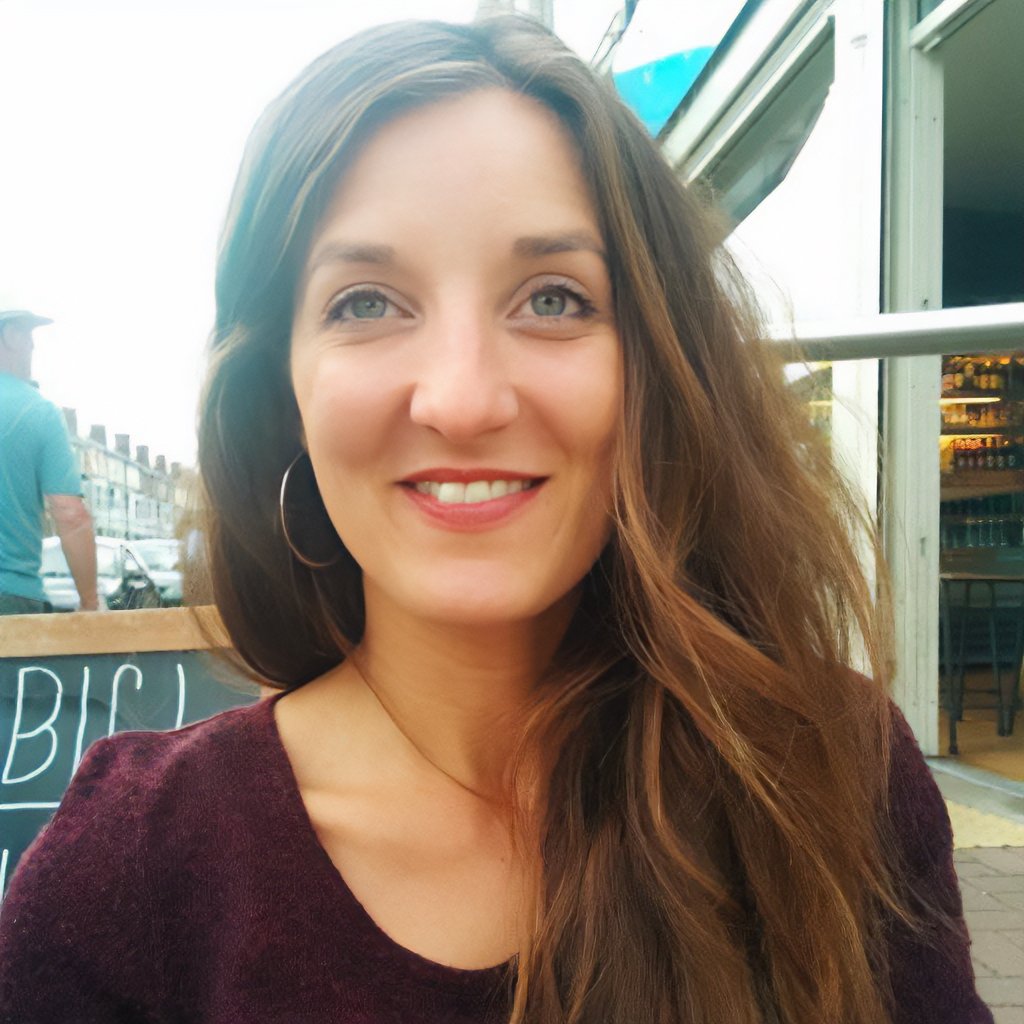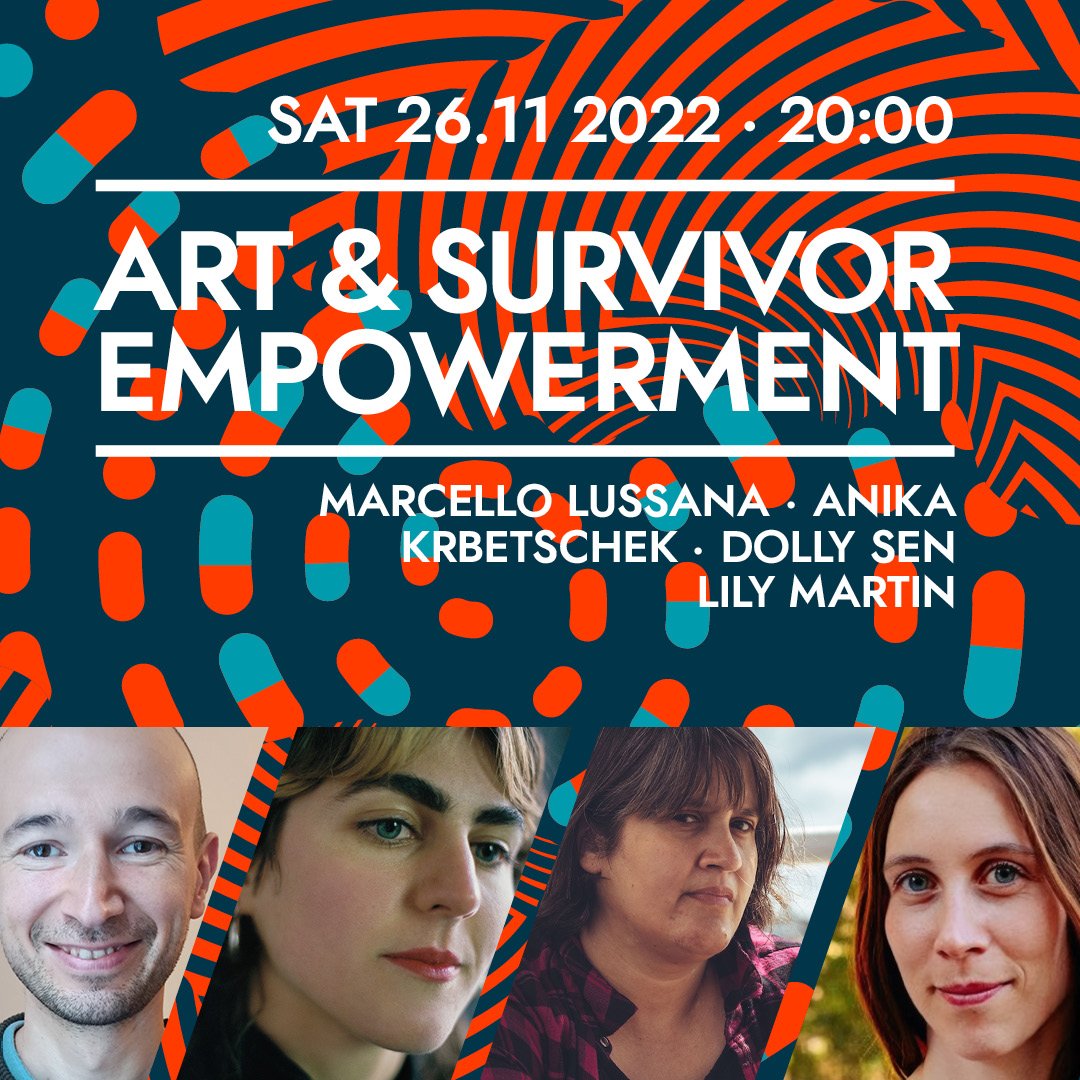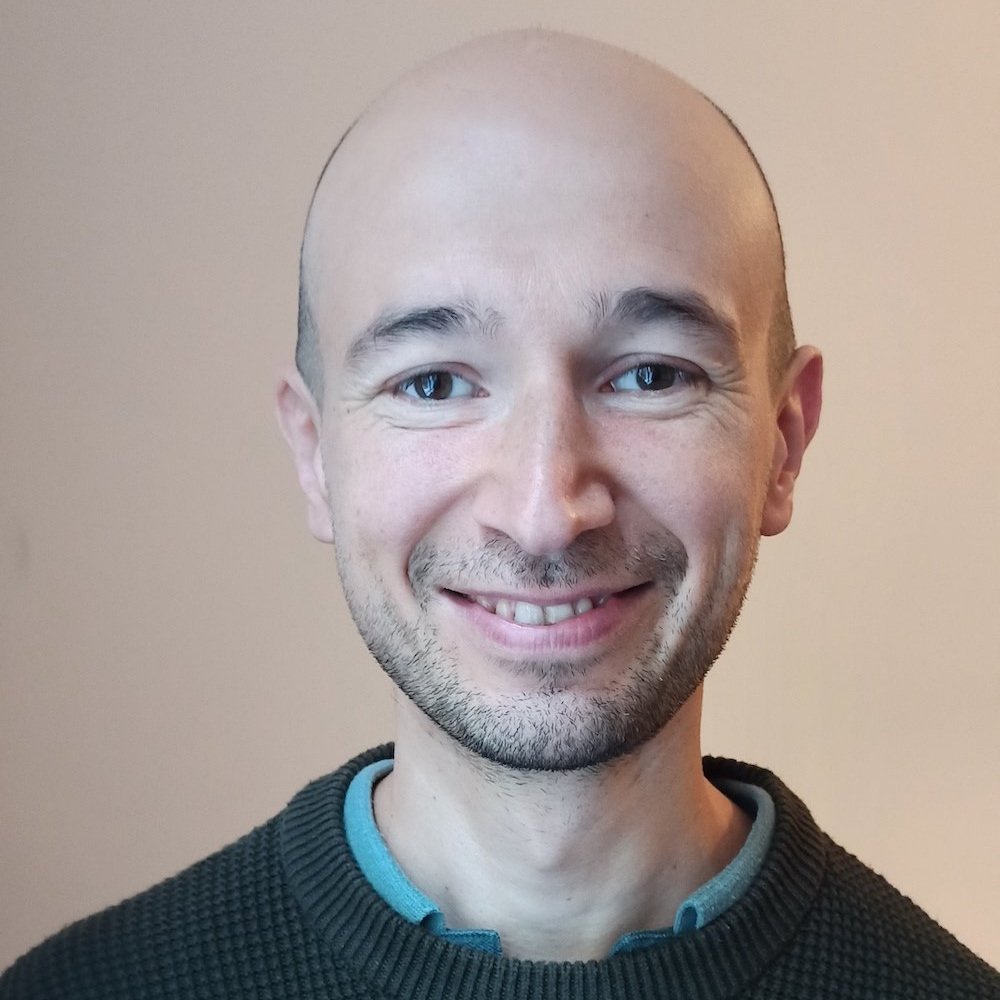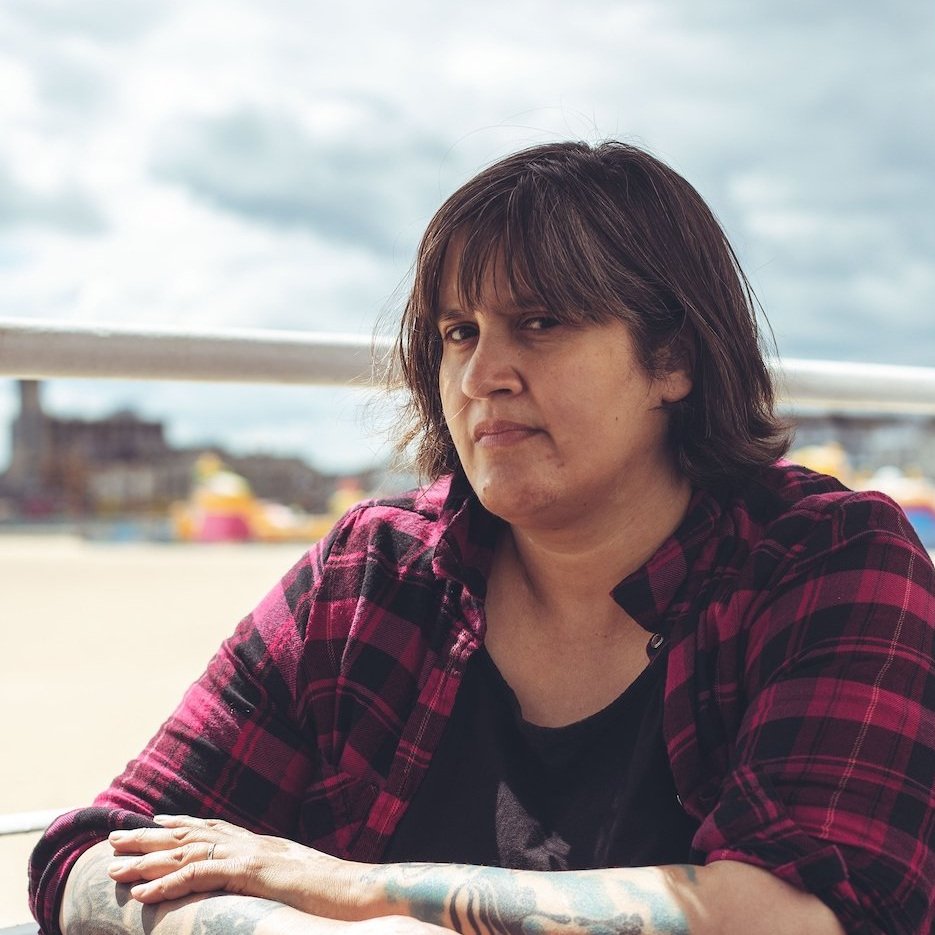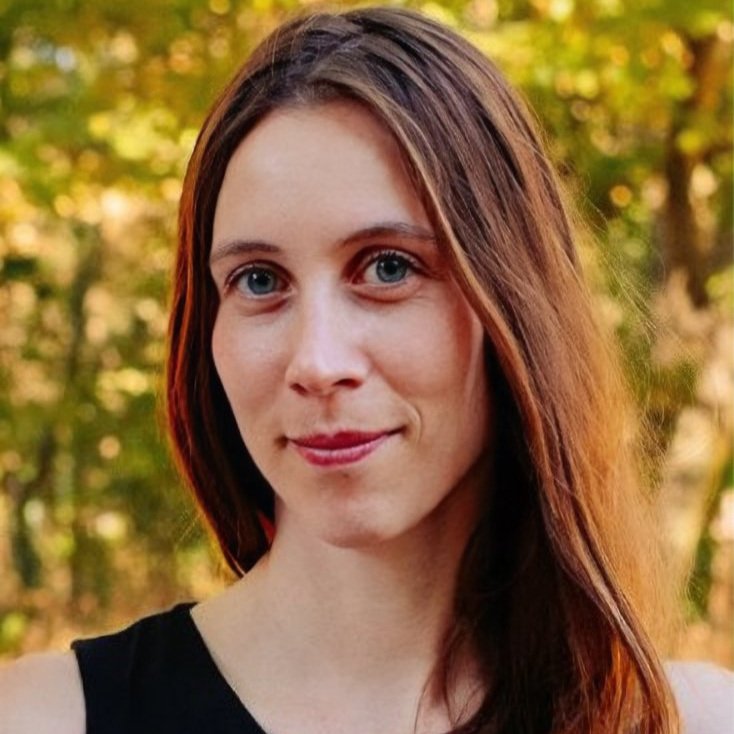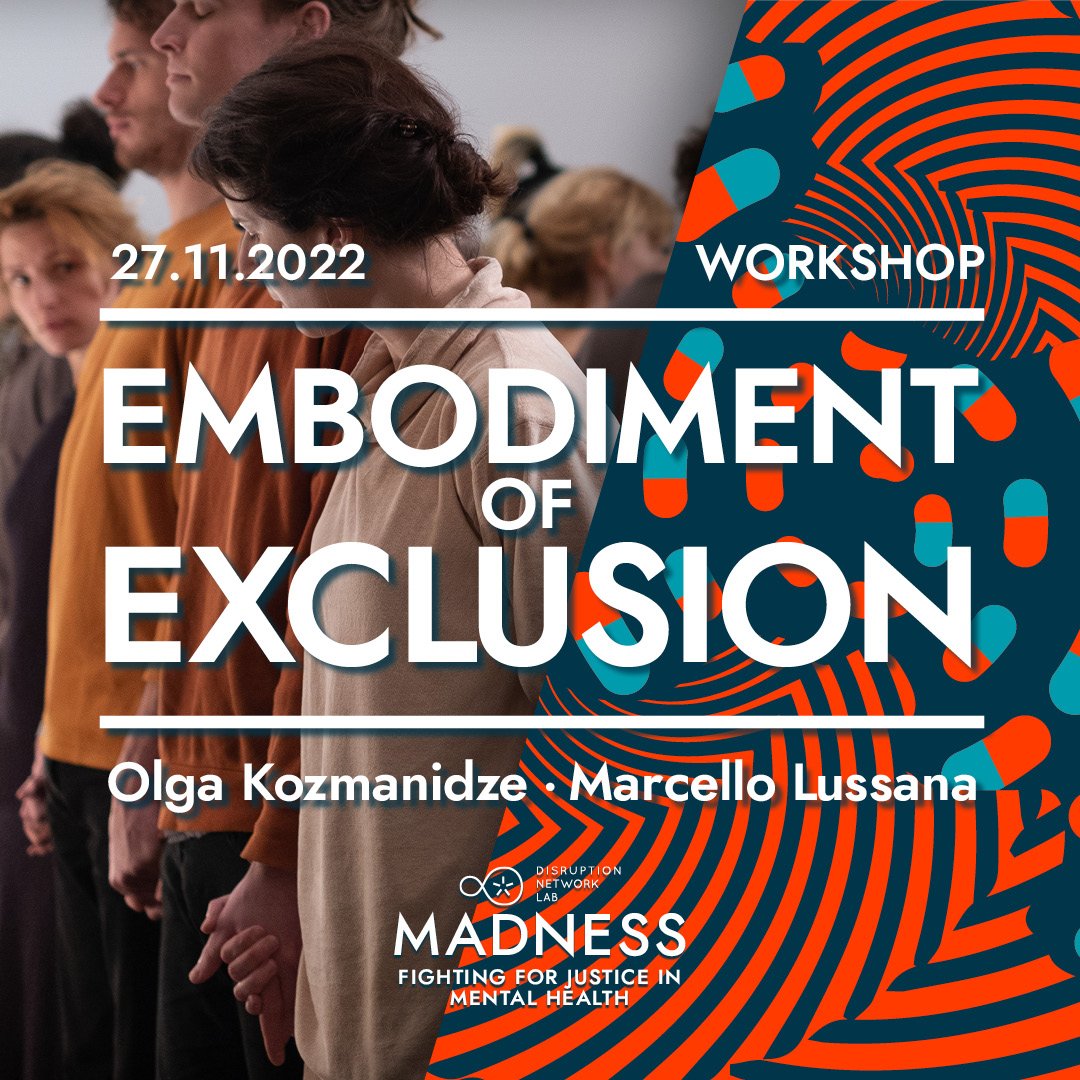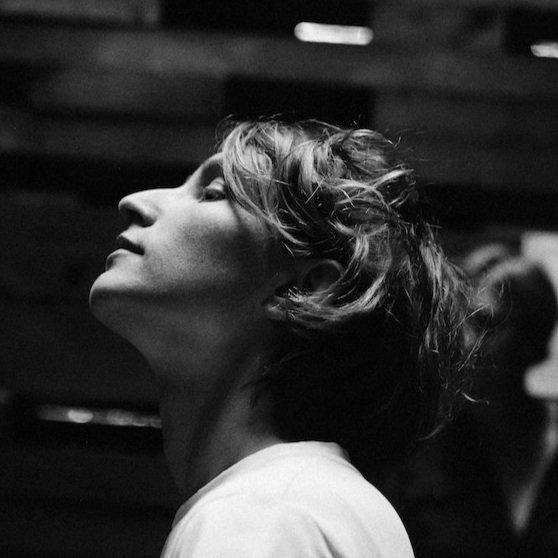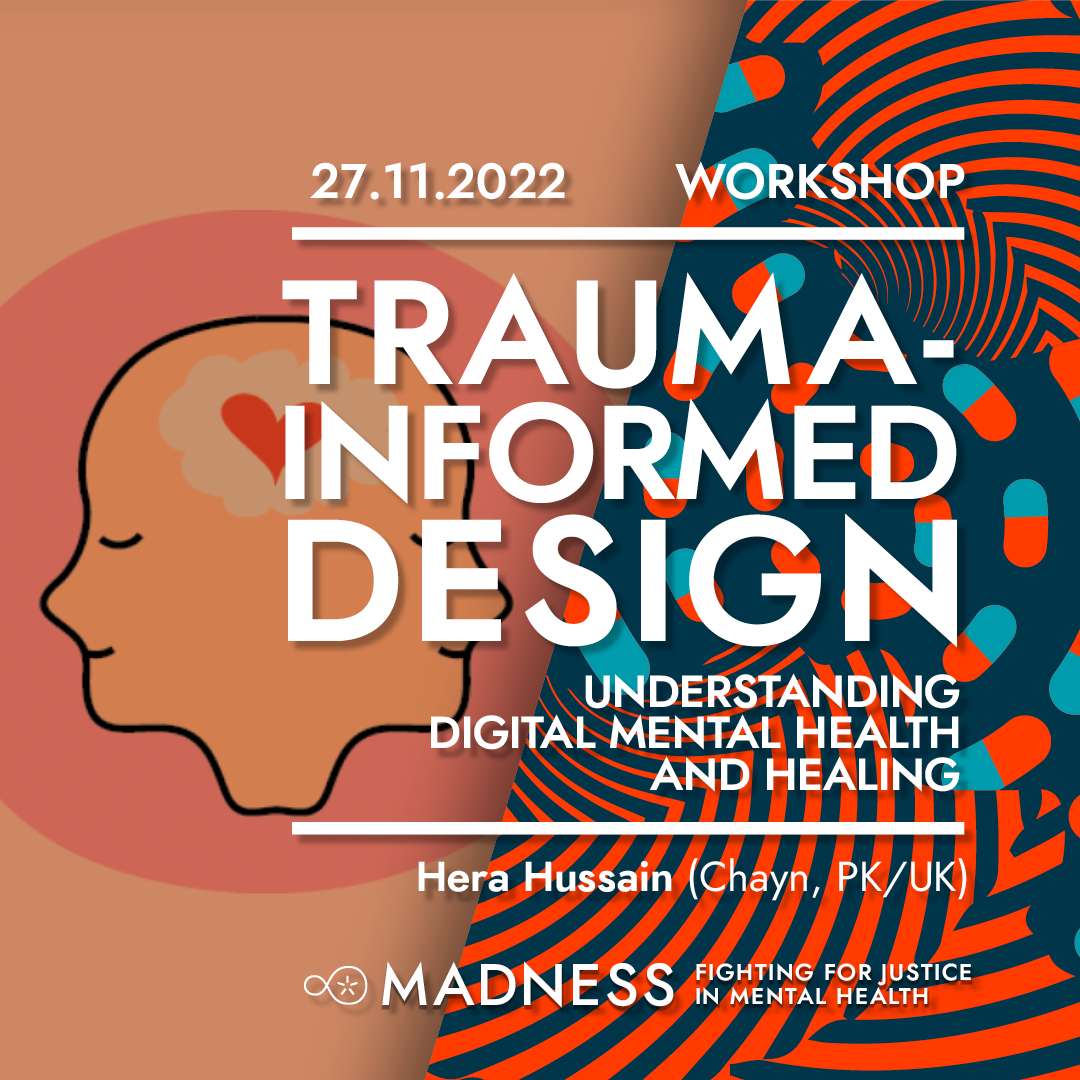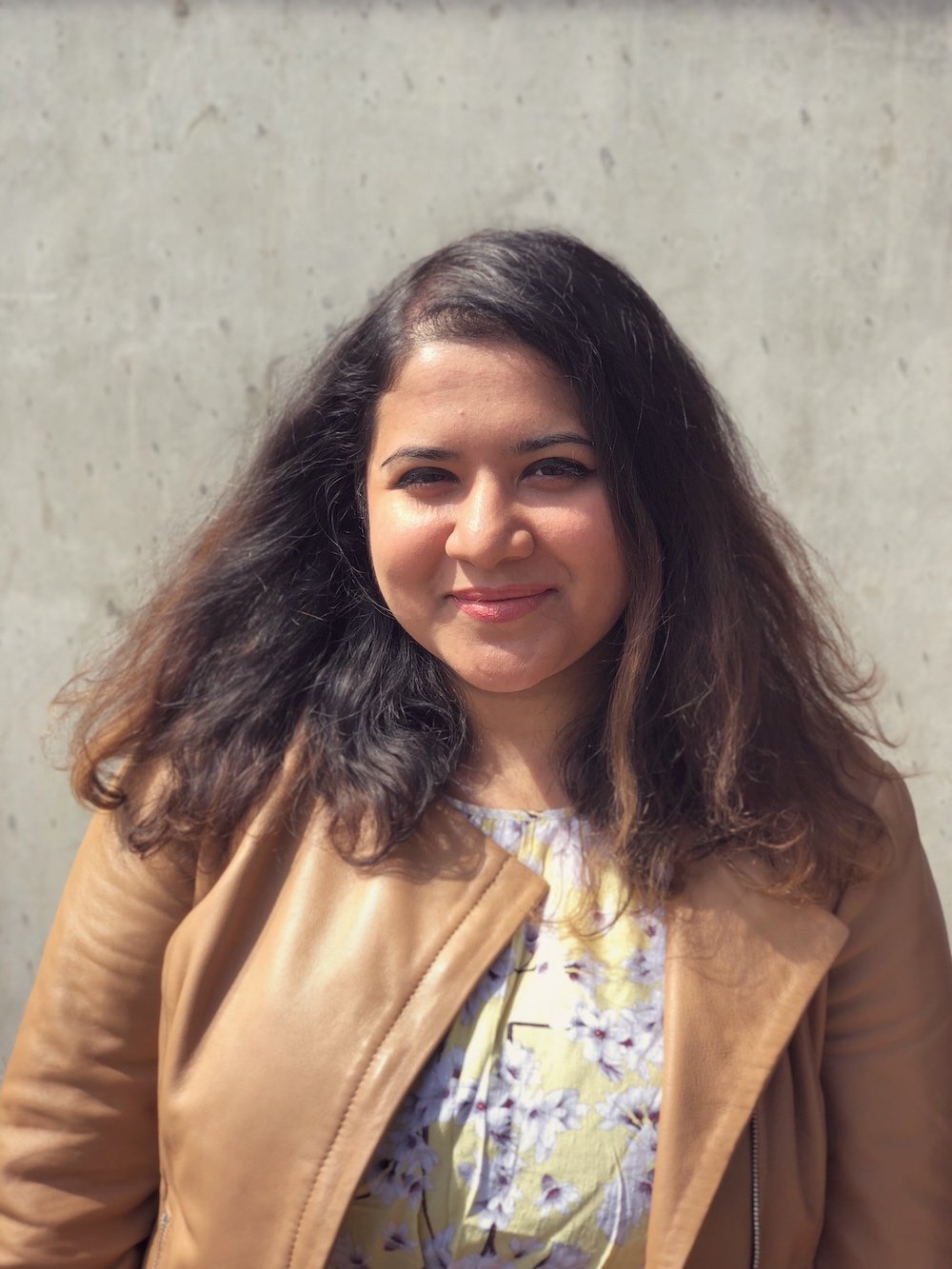#DNL28 · November 25–27 · 2022
MADNESS
Fighting for Justice in Mental Health
THE 28TH CONFERENCE OF THE DISRUPTION NETWORK LAB
KUNSTQUARTIER BETHANIEN - BERLIN & STREAMING
Videos · Schedule · Full Programme · Introduction · Workshops · Tickets · Speakers
Help us organize more critical events & research by becoming a member. For just 50€ you will get access to a full year of conferences, workshops, screenings and more!
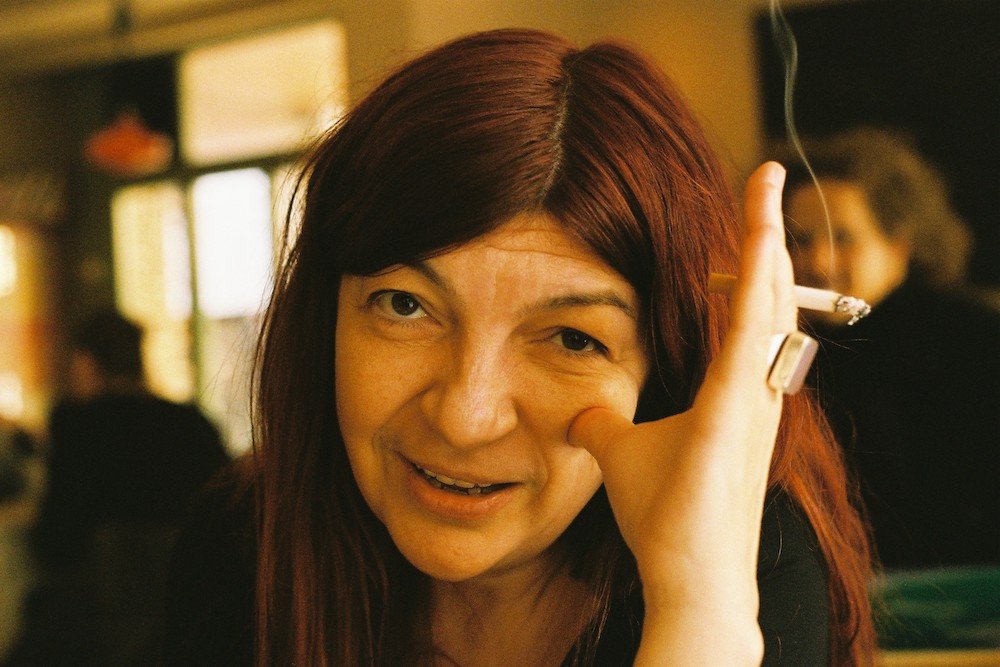
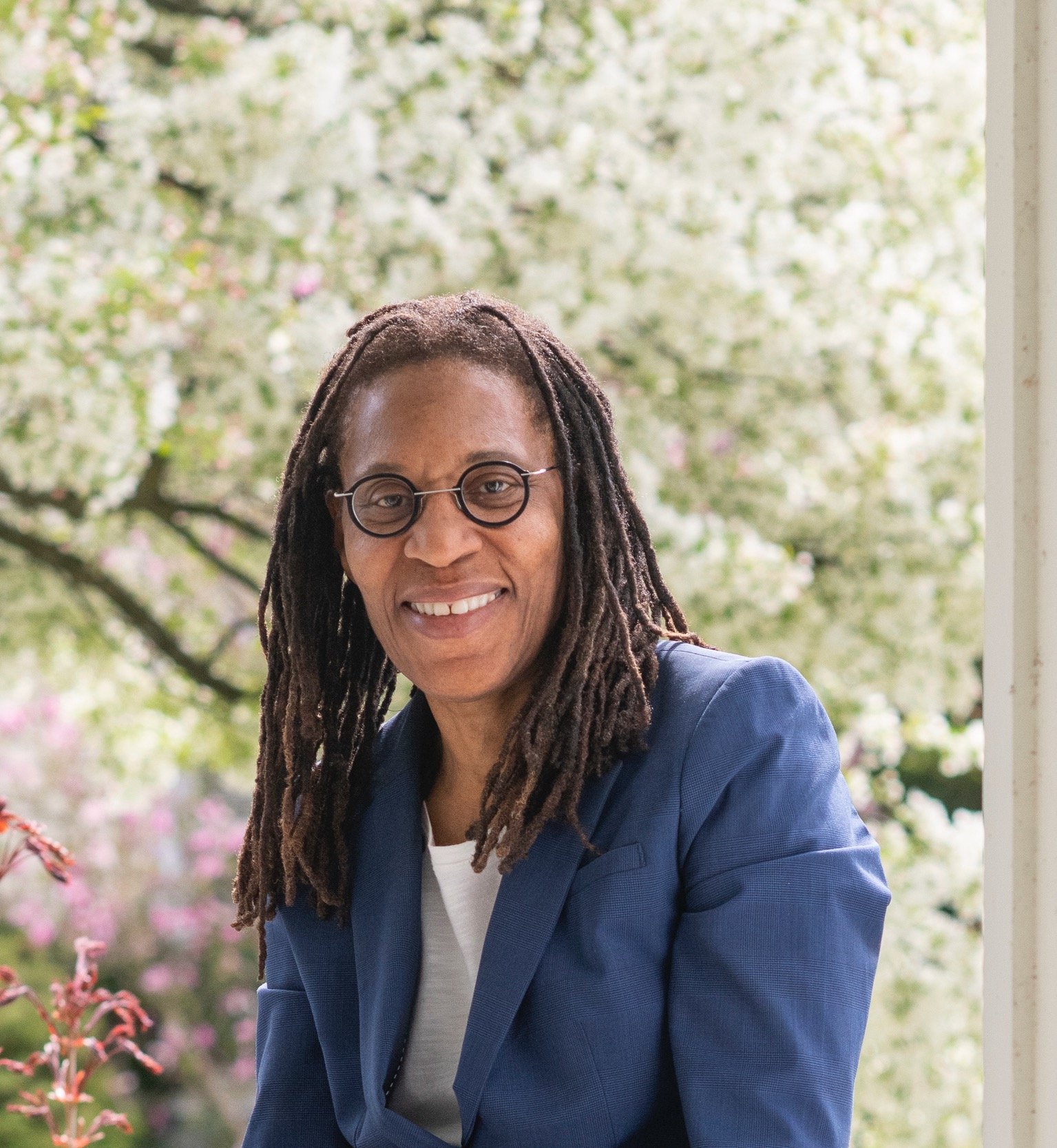
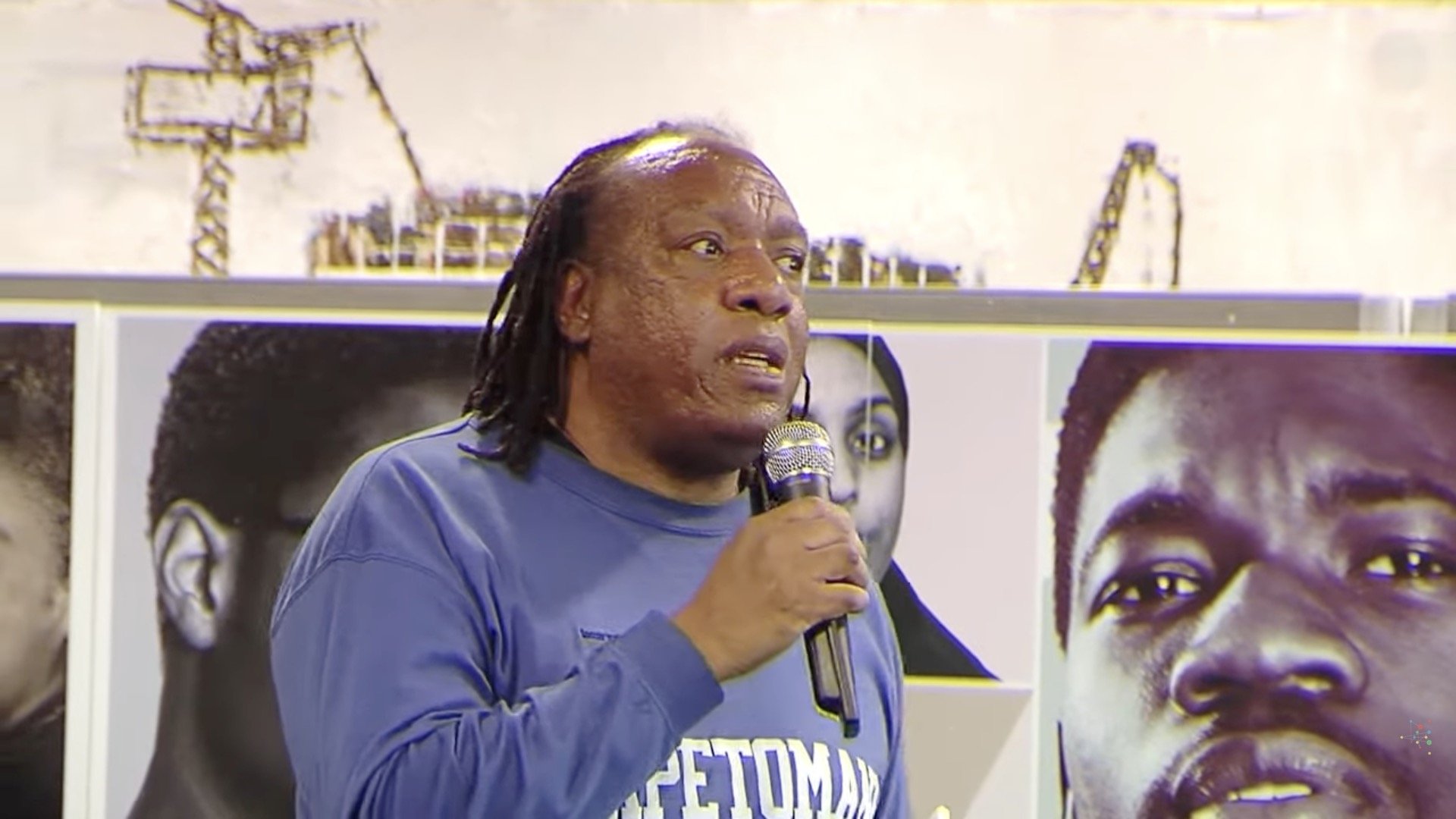
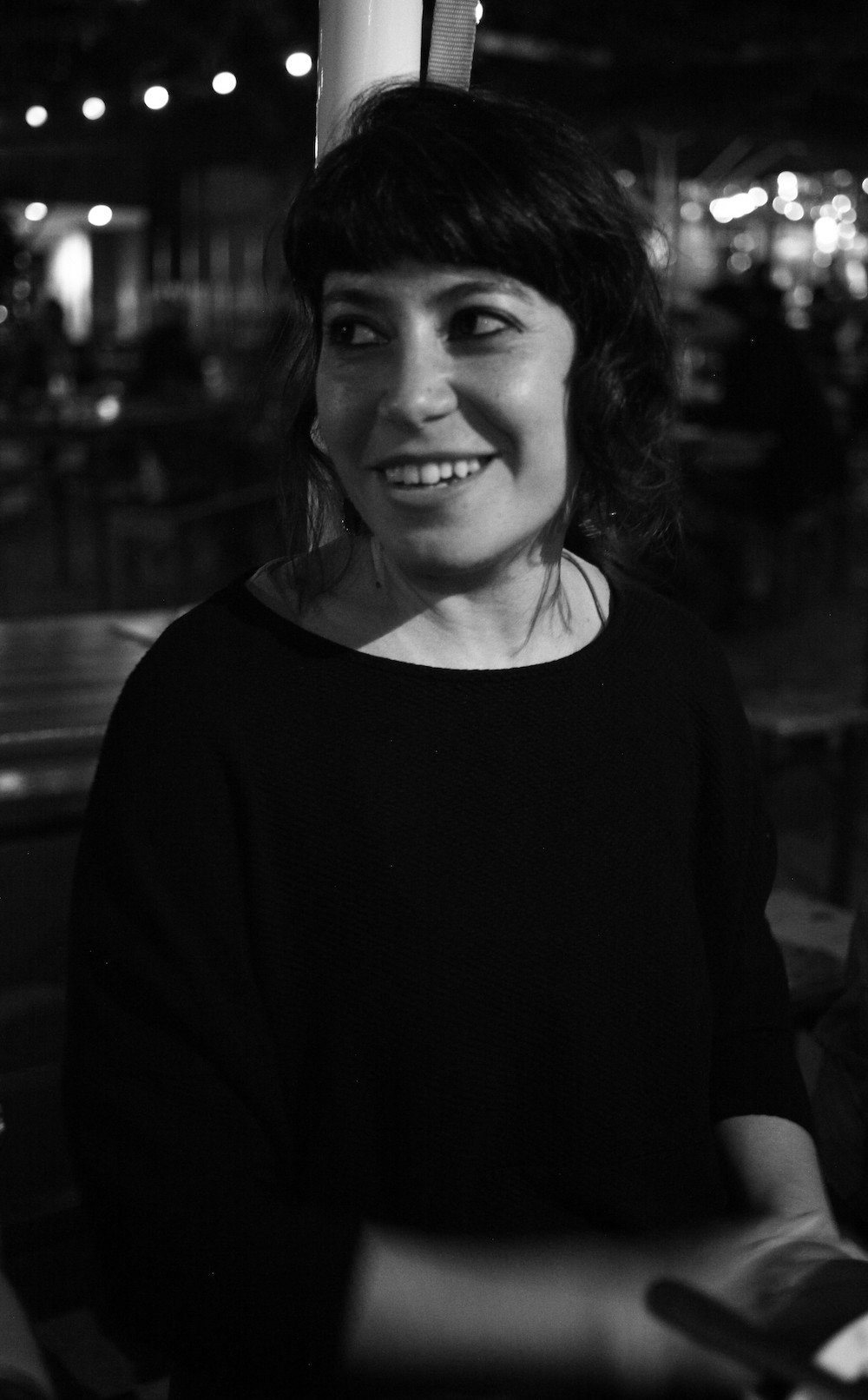
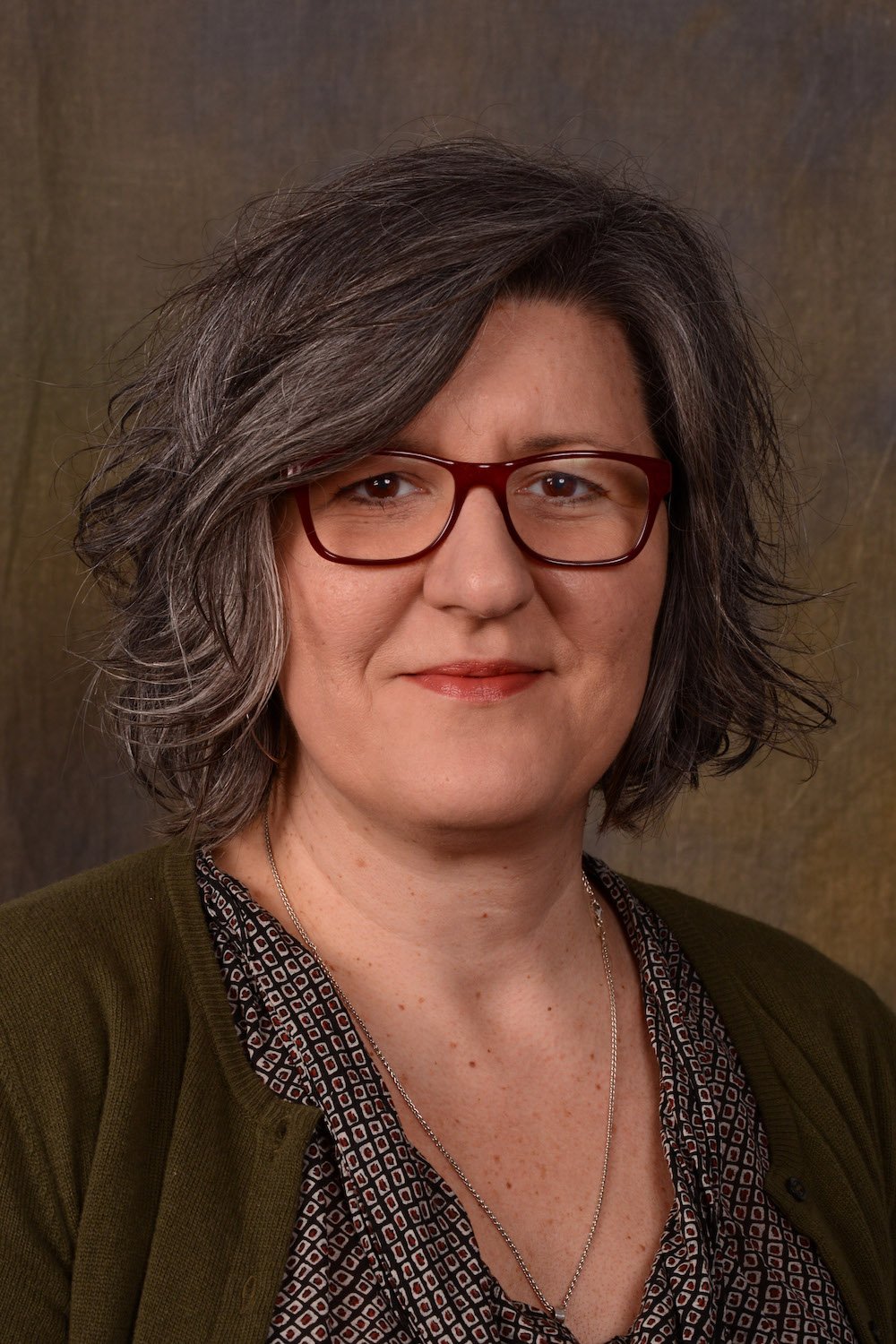
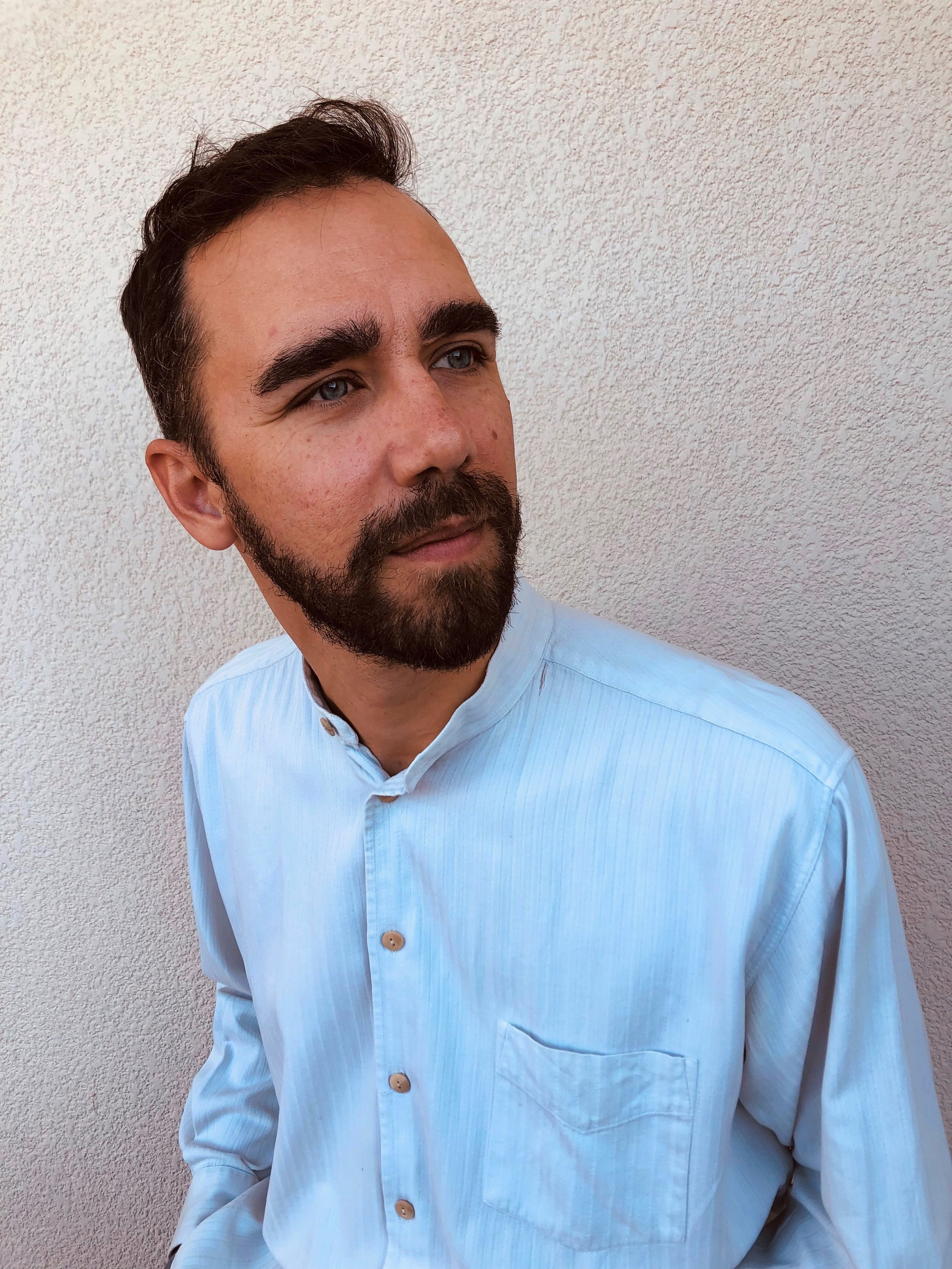
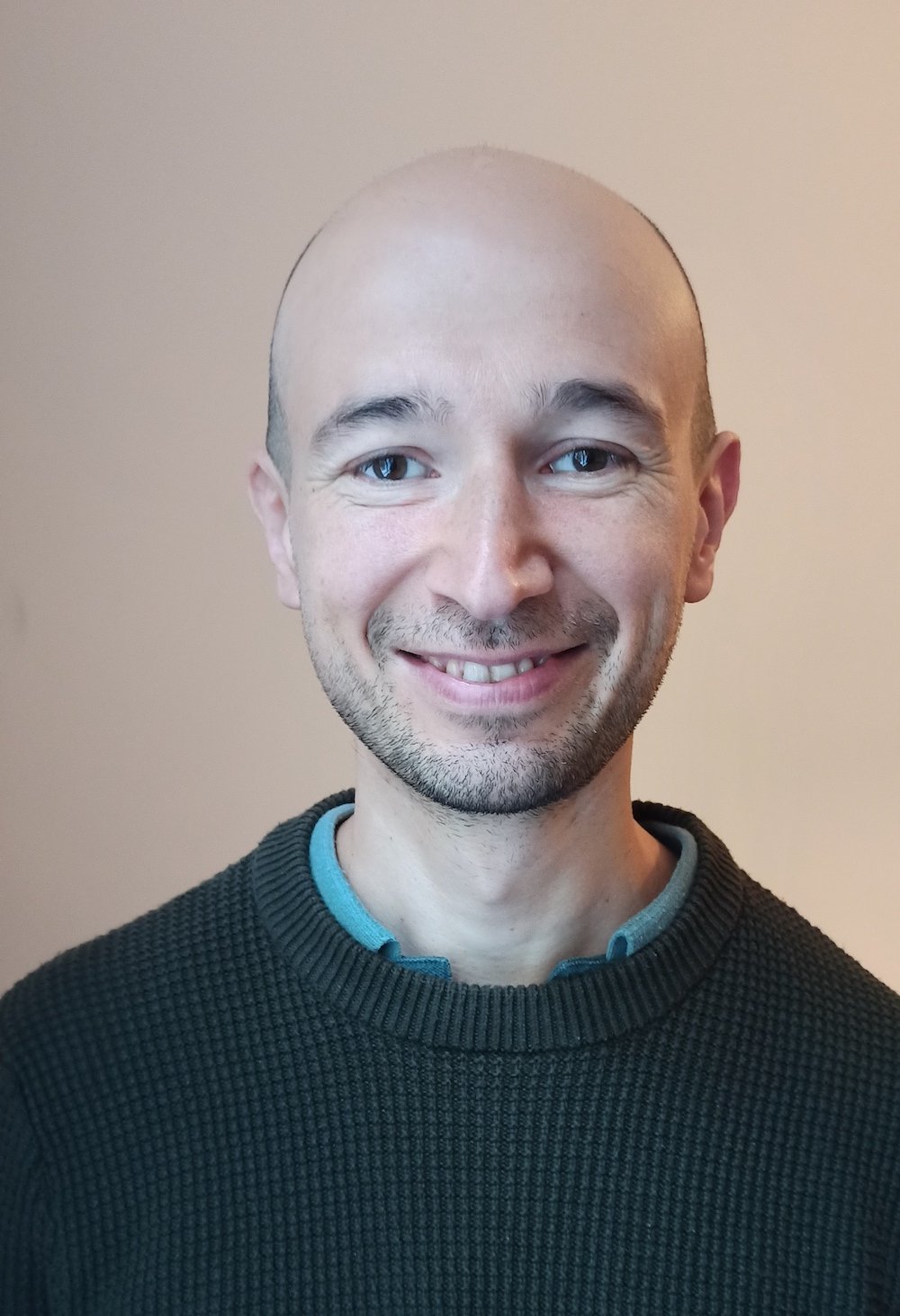
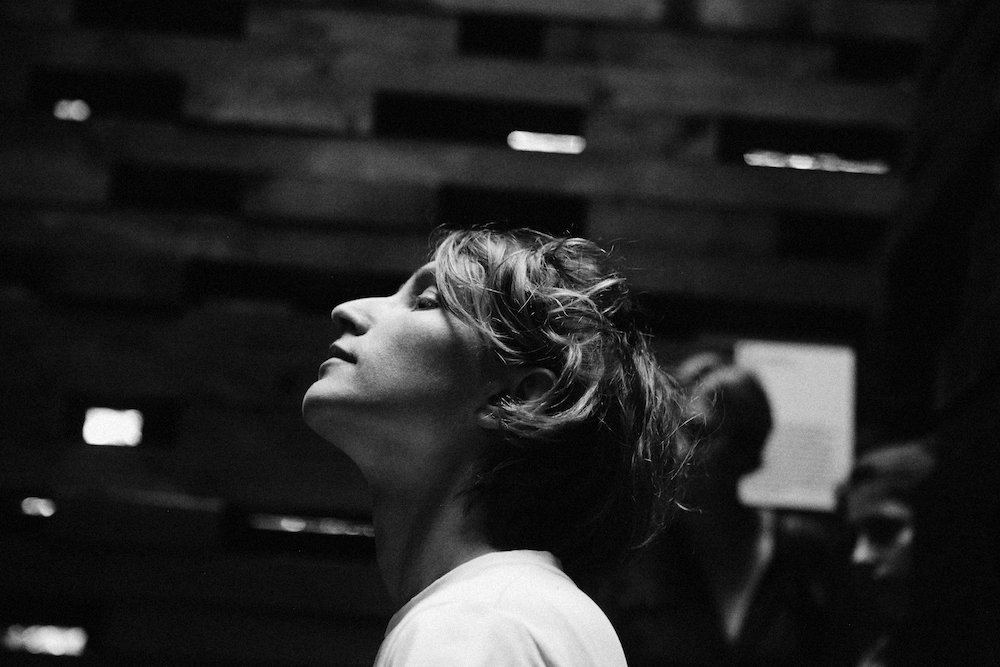

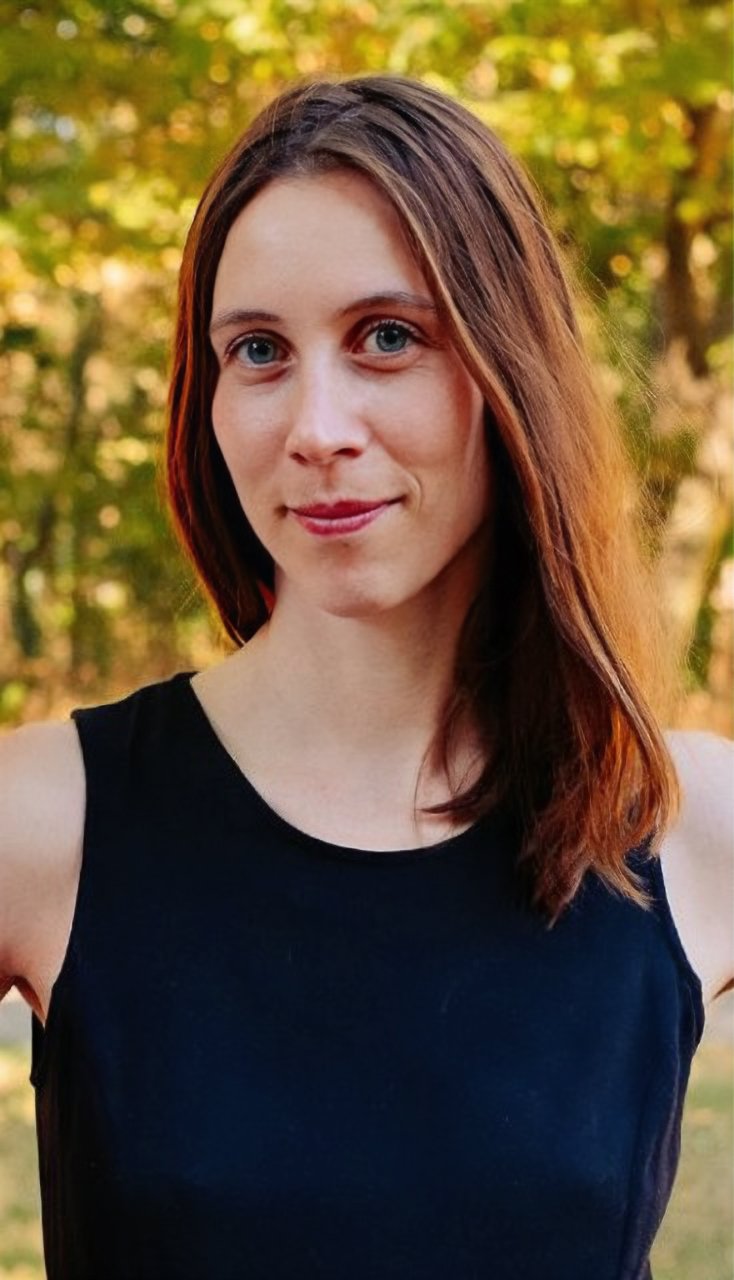
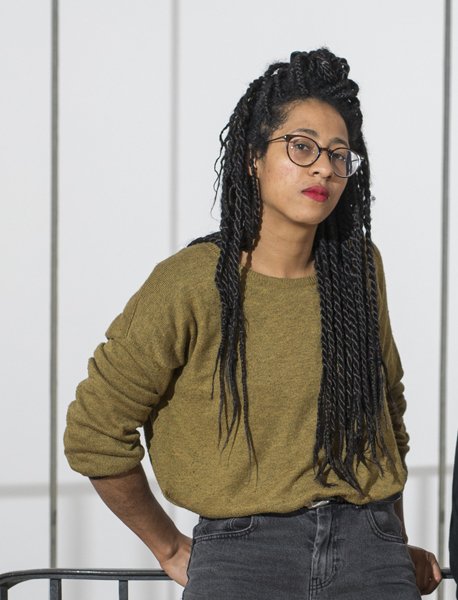
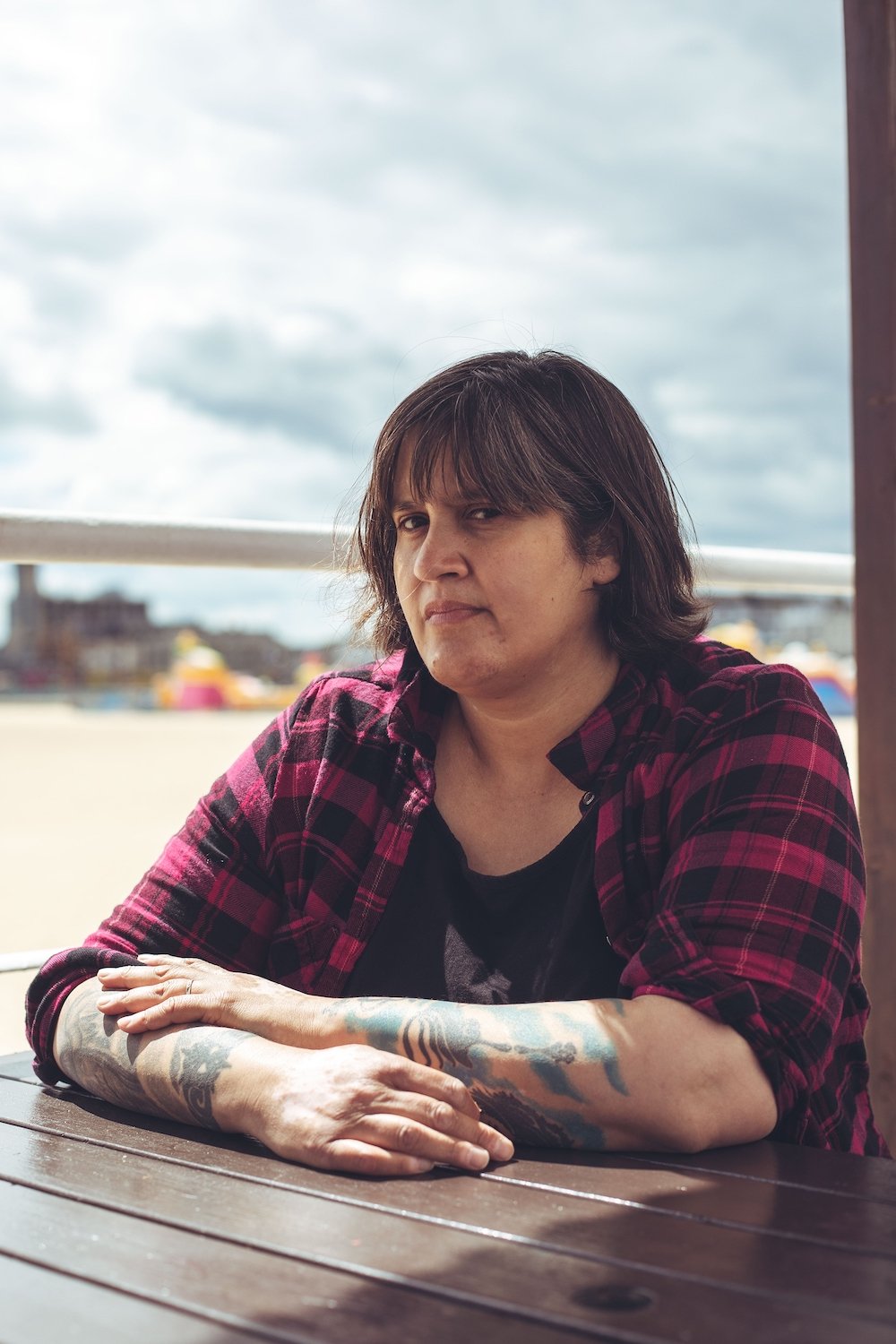
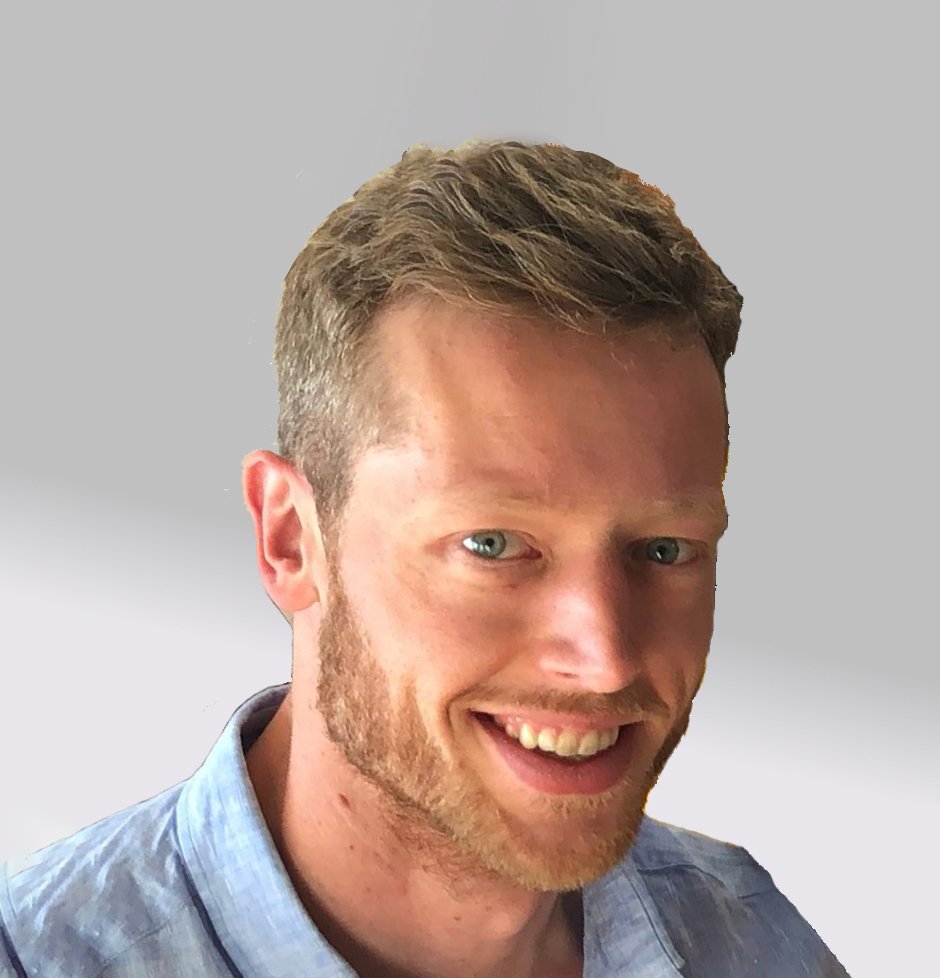
Follow the streaming for free on this webpage on Nov. 25–27. The screening and workshops are not streamed. No tickets are needed to watch the streams.
What does it mean to have a just mental health care system and who has access to it? Who decides who is labelled as mad?
28th conference of the Disruption Network Lab. Concept by Tatiana Bazzichelli & Elena Veljanovska. curated by Elena Veljanovska. Workshops curated by Nada Bakr.
LOCATION: STUDIO 1, KUNSTQUARTIER BETHANIEN, MARIANNENPLATZ 2, 10997 BERLIN
STREAMED FOR FREE
BACK TO TOP
Schedule
Download PDF
Friday, November 25 · 2022
16:30 · Doors Open
17:00 – 17:15 · OPENING & INTRODUCTION
Tatiana Bazzichelli (Artistic Director, Disruption Network Lab, IT/DE), Elena Veljanovska (Curator, Disruption Network Lab, MK/DE), Nada Bakr (Community Curator & Project Manager EG/DE).
17:15 – 18:30 · KEYNOTE · Madness and Systemic Oppression
Jasna Russo (Independent Researcher & Consultant, DE), Colin King (Teacher, Lecturer, Researcher, UK). Moderated by Elena Veljanovska (Curator, Disruption Network Lab, MK/DE).
19:00 – 20:30 · PANEL · Decolonising Psychiatry: Mental Health in Conflict Zones
Lamia Moghnieh (Postdoctoral Researcher, University of Copenhagen, LB/DK), Reima Maglajlić (Reader in Social Work, University of Sussex, UK), Donato Zupin (Psychiatrist, Department of Mental Health - WHO CC, Trieste, IT). Moderated by Aouefa Amoussouvi (Researcher, The Institute for Endotic Research (TIER), FR/DE).
Saturday November 26 · 2022
16:00 · Doors Open
16:30 – 17:00 · PERFORMANCE · Sentire
Marcello Lussana (Sound Designer, Researcher, IT/DE) and Olga Kozmanidze (Artist, DE/IT).
17:15 – 18:45 · KEYNOTE · State Violence and Mental Health
Wilda L. White (Founder, MadFreedom, Inc., US), China Mills (Healing Justice Ldn, UK). Moderated by Julian Schwarz (Psychiatrist, DE).
19:15 – 19:40 · SCREENING · Faces of an Exhibition
Documentary by Nina Wesemann (Filmmaker, DE) and Simon Reichel (Filmmaker, DE).
20:00 – 21:30 · PANEL · Art and Survivor Empowerment
Marcello Lussana (Sound Designer, Researcher, IT/DE), Anika Krbetschek (Artist, DE), Dolly Sen (Artist and Activist, UK). Moderated by Lily Martin (Researcher, Pop-up Institut, Alanus University of Arts and Social Sciences, DE).
21:30 – 21:45 · CLOSING
Tatiana Bazzichelli (Artistic Director, Disruption Network Lab, IT/DE), Elena Veljanovska (Curator, Disruption Network Lab, MK/DE).
Sunday November 27 · 2022
Workshop Programme
12:00 – 14:30 · WORKSHOP · Embodiment of Exclusion
Olga Kozmanidze (Artist, DE/IT) & Marcello Lussana (Sound Designer, Researcher IT/DE).
15:30 – 17:30 · WORKSHOP · Trauma-Informed Design: Understanding Digital Mental Health and Healing
Hera Hussain (Founder, Chayn PK/UK).
BACK TO TOP
Conference Introduction
What does it mean to have a just mental health care system and who has access to it? Who decides who is labelled as mad?
Funded by:
Senatsverwaltung für Kultur und Europa (Senate Department for Culture and Europa, Berlin), The Reva and David Logan Foundation (grant provided by NEO Philanthropy), KULTUR.GEMEINSCHAFTEN bei der Kulturstiftung der Länder, Beauftragte der Bundesregierung für Kultur und Medien, Konjunkturprogramm für den Kultur- und Medienbereich NEUSTART KULTUR (KULTUR.GEMEINSCHAFTEN, German Federal Cultural Foundation, BKM/German Government Commissioner for Culture and the Media, NEUSTART KULTUR/Restart Culture Programme of the Cultural and Media Sector).
In cooperation with: Global Voices.
In collaboration with: Pop-Up Institut
Partner Venues: Kunstraum Kreuzberg /Bethanien, Superrr Lab, ACUD MACHT NEU
Outreach Partner: Aksioma, Institute for Contemporary Art Ljubljana.
Media Partners: taz, Il Mitte, Exberliner
The international conference MADNESS: Fighting for Justice in Mental Health takes place on November 25 – 27 at Kunstquartier Bethanien in Berlin. The 28th Conference of the Disruption Network Lab investigates systems of mental health care and support, focusing on prevailing discourses and practices, biases and inequality. It is exploring the possibilities of a mental health system which puts human rights and justice in the centre of its practice. The conference introduces the perspectives of scientists, human rights and social justice activists, artists, doctors and practitioners as well as those closely affected – the people living with mental illness, through keynotes, panels, performance, film screening, workshops and meetups.
What does it mean to have a just mental health care system? Who is deciding who is labelled as mad? Who is telling the story of madness? Who has access to mental health care services? Can we decolonise psychiatry? Different perspectives and positions, such as scientific and social discourses, the medical practice, the fight against profit-oriented health care management, as well as the social, racial and ethnic differences of those affected, will be combined. This conference brings together researchers and practitioners but gives also specific attention to the perspectives and needs of people living with mental illnesses. The goal of the conference is to give visibility and voice to those closely affected, to emphasise the necessity for action in the way this problem is being treated and to think of examples for more humane policies.
The speakers provide critical insights into their activities and positions at the intersection of psychiatry, psychology, activism, art and social justice. Jasna Russo talks about the meaning of justice in mental health and Colin King addresses the institutional racism and structural discrimination within the UK public health care. Wilda L. White discusses the work that must happen outside the U.S. mental health system to achieve justice within the U.S. mental health system, whereas China Mills gives a global overview of the so-called state violence and what can justice in Mental health be. The Friday panel focuses on the structures of inclusive and just mental health support system and decolonising psychiatry, while the art programme and panel on Saturday display the great capacity of the artistic practice to overcome mental health stigma and frame proactive practices.
Concept by Tatiana Bazzichelli & Elena Veljanovska. Curated by Elena Veljanovska. Community & workshops curated by Nada Bakr.
BACK TO TOP
Full Programme
Download PDF
Friday, November 25 · 2022 · Get tickets
16:30 · Doors Open
17:00 – 17:15 · OPENING & INTRODUCTION
Tatiana Bazzichelli (Artistic Director, Disruption Network Lab, IT/DE), Elena Veljanovska (Curator, Disruption Network Lab, MK/DE), Nada Bakr (Community Curator & Project Manager EG/DE).
17:15 – 18:30 · KEYNOTE
Madness and Systemic Oppression
Jasna Russo (Independent Researcher & Consultant, DE), Colin King (Teacher, Lecturer, Researcher, UK). Moderated by Elena Veljanovska (Curator, Disruption Network Lab, MK/DE).
What is madness and who has the right to tell its story?
The first keynote with Jasna Russo and Colin King introduces the complexity of the conference topic by viewing the multifaceted stories of madness – as a social construct, as a historical development, and as a system of oppression. It gives an insight into the current theory and practice, as well as on the efforts to organize and protest. It gives shape to the possibilities to have a voice and to claim knowledge within structures where the perspectives of those labelled as mad have been historically suppressed and denied. It addresses the need for epistemic, as well as social justice, and directly address the inherent racism in the state institutions of health and justice, which instead of protecting, perpetually harm individuals. The speakers look at the topic from their activist and theoretical points of view, but also from their personal experiences. They discuss emancipation strategies that can be acquired through research, political organizing and advocacy. Lastly, they are exploring the possibilities for transformative practices that center marginalized and oppressed lives.
In her keynote, Jasna Russo situates the institution of psychiatry within wider oppressive social structures. She briefly presents its history, its social mandate and the formation of the “psychiatric industrial complex.” At the same time, she highlights a parallel but far less visible phenomenon that has existed since the very beginning of psychiatry: political organizing by people declared mad, psychiatrically disordered or mentally ill. Their dual purpose is to claim their fundamental rights and to document their own truths and knowledge. She discusses dominant approaches to this distinctive knowledge base, raising questions of silencing, epistemic injustice and epistemic violence. She is critically engaging with initiatives to “humanize” psychiatry and argues for the potential and power of collective first-person knowledge to radically revisit the dominant understandings of madness and distress – and, most importantly, to transform societal responses to these human experiences.
Colin King talks about race and injustice in Mental Health in his keynote address. Data on mental health and race injustice in the UK shows that black Caribbean men are significantly more likely to be detained than those of white ethnic groups (odds ratio 2.53). Black African patients are significantly more likely to be detained than those of white ethnic groups (odds ratio 2.27). South Asian Patients are slightly more likely to be admitted compulsorily compared to white ethnic groups (odds ratio 1.33). Black Caribbean patients are significantly more likely to be re-admitted compared to white ethnic groups (odds ratio 2.30). The keynote looks at mental health as a modern Drapetomania that is apparent in the criminalization of the black experience in the neo-liberal mental health systems in modern Britain. Colin then confronts the concepts of European whiteness vs. the black body seen as madness, and talks about his personal experiences of injustice he faced in the educational and the mental health care system in the UK. At the end of his talk, he discusses this year’s article in Lancet Psychiatry “Black men wanted for restraint and research?” as a call for people working in the mental health system to become aware that death is often a consequence of diagnosing the Black body, and to stop the state criminalization of the victims’ distress in official reports, rather than holding people accountable for state killings.
19:00 – 20:30 · PANEL
Decolonising Psychiatry: Mental Health in Conflict Zones
Lamia Moghnieh (Postdoctoral Researcher, University of Copenhagen, LB/DK), Reima Maglajlić (Reader in Social Work, University of Sussex, UK), Donato Zupin (Psychiatrist, Department of Mental Health - WHO CC, Trieste, IT). Moderated by Aouefa Amoussouvi (Researcher, The Institute for Endotic Research (TIER), FR/DE).
The panel discusses the processes of decolonising Western and Eurocentric notions of psychiatry in the light of the discussion about Mental Health in Conflict Zones. It puts focus on the various challenges to mental health provision during a war conflict and discuss strategies for survival in and outside of conflict zones. The panel further discusses the structures of support that are being built after a conflict, again in conflict zones themselves and outside of them. Furthermore, it emphasizes the translation of traumatic experience and the need to overcome purely Western notion of medicine in a cross-cultural setting, and discuss the relationship between mental illnesses and cultural, socio-economic and political contexts. This highlights the need to recognise other systems of knowledge and emotional experience and expression and it looks into the possibilities of decolonising psychiatry in order to dismantle racism, especially when approaching non-western survivors in the mental health care sector.
Reima Maglajlić talks about distress caused by political conflicts with a focus on Bosnia and Herzegovina (BiH). She will focus on two aspects. She first provides an overview of professional and experiential responses to distress caused by political conflicts in BiH. Second, she provides a brief summary of the findings from two co-produced qualitative studies on experiences of distress caused by the war in BiH. The studies are novel in drawing their inspiration from the interdisciplinary field of Mad Studies, which prioritises social understanding and interpretation of madness and distress, as well as emphasises experiential knowledge, both of distress and of the conflict-affected geographies. The talk places particular focus on why access to justice is important for people who experience distress, both in conflict-affected countries and elsewhere, and on the types of support that people with lived experience reported to value the most.
In her talk, Lamia Moghnieh draws her conclusions from several ethnographic and archival cases in Lebanon and other MENA (Middle Eastern and North African) societies. Inspired by the science-fiction style of the black feminist writer Octavia Butler, Moghnieh looks at the politics of trauma, grief, and resilience in these geographies, while drawing parallels to the ways in which we survive and recover from violence, and the ways in which we are expected to do so by psychiatric, humanitarian and state institutions. In order to do so, she tries to move beyond the binary of trauma/resilience, towards paying more attention to everyday forms of survival, adaptation and rebuilding during war, economic and ecological crises, in times when “the world as we know it” is falling apart.
In his talk, Donato Zupin addresses the systemic racism against migrants and ethnic minority groups in psychiatric institutions. He gives his local perspective from Trieste, Italy, to clarify some aspects of this phenomenon. Since the 1970’s, Trieste has been known for the radical deinstitutionalization processes, kick-started by Franco Basaglia, which take a freedom-first social-rights based approach to mental disorders. The city is also a key point of the Balkan Route and hosts some of the strongest anti-immigrant political movements. In his talk, Zupin addresses the cultural contradictions in his work as a coordinator of the Working Group on Migration of the Mental Health Department, where he has had the chance to observe how public institutions and NGOs interact when concepts such as mental health, migrations, solidarity, and social control come into play.
BACK TO TOP
Saturday November 26 · 2022
16:00 · Doors Open
16:30 - 17:00 · PERFORMANCE
Sentire
Marcello Lussana (Sound Designer, Researcher, IT/DE) and Olga Kozmanidze (Artist, DE/IT).
Hearing and feeling are bound together in the Italian word sentire. The interdisciplinary project Sentire weaves these senses together using sensors that connect movement and contact to sound. The textures, timbres and rhythms of a sound environment are transformed by the interactive system of Sentire based on the distance and tactile encounters between two participants. The algorithmic sound environment has several configurations ranging from spacey and atmospheric to percussive and rhythmic, with touch and proximity each transforming the environment differently.
Sentire emerged from the MovLab community at the art-science space Spektrum in Berlin in 2016, where sound-artist and researcher Marcello Lussana met performer and musician Olga Kozmanidze. The Sentire system was developed by Marcello Lussana (Project Coordination, Sound Design), Pascal Staudt (Technical Director, Sonic Interaction Design) and Bruno Gola (Software Development). In 2019, the project received funding by the German Ministry of Education and Research (BMBF) for a 3-year research at Humboldt University Berlin.
17:15 – 18:45 · KEYNOTE
State Violence and Mental Health
Wilda L. White (Founder, MadFreedom, Inc., US), China Mills (Healing Justice Ldn, UK). Moderated by Julian Schwarz (Psychiatrist, DE).
The keynotes bring two different perspectives on State and Corporate violence as root causes of mental distress, which however, are often hidden in the individualisation of suffering. The speakers explain how political and cultural systems, the pharma industry, the media and corporations are contributing factors and inevitable influences on any individual diagnosis. They address the existing stigma and injustice towards people diagnosed or labelled mad, their socio-economic predicament such as unemployment, and point to aspects of sanism in mainstream media. Both speakers point to the need to recognize these “silent killers” in the labyrinth of state institutions, welfare programs and market driven health provision, and criticize their failing to improve the livelihood of people who live with mental conditions.
In her keynote, Wilda White argues that the solution to injustice in the mental health system lies not within the mental health system, but rather in shaping the cultural politics of American society. She shares her ideas for shifting attitudes, opinions, beliefs, and perspectives, and influencing the media and the arts, which all shape American society and political opinion and give rise to the social, economic, and legal realities that sustain an underfunded, second-class, coercive mental health system that shortens lives, restricts opportunities, and dashes hopes. In the United States, people labelled or diagnosed with mental illness have the highest rates of unemployment, the highest rates of disproportionate incarceration, are most likely to be killed by police, and die 20 to 25 years prematurely. Most Americans do not want to work with someone with a mental illness and do not want someone with a mental illness marrying into their family. While most people diagnosed or labelled with a mental illness are able and willing to work, surveys of U.S. employers reveal that half are reluctant to hire someone with a past psychiatric history, approximately seven in 10 are reluctant to hire someone currently taking antipsychotic medications, and one in four employers say they would fire someone who had not disclosed a mental illness. People with mental illnesses are the butt of jokes on late night television, scapegoated for gun violence and routinely demeaned at every level of American society.
China Mills talks about the weaponization of mental health – state violence, accountability, and justice. There are many ways to tell the story of Global Mental Health – it is manifold, and as it progresses it is reworked and made meaningful (or not). But its agenda – often set in the global North by a privileged few – tends to be diagnostic and treatment-based. In the dominant story, state and corporate violence – violent systems and institutions that distress people and make life unliveable – are often not part of the diagnosis. Root causes can get lost when distress is reframed as an individual symptom. But what about when distress, pain and suicide are symptoms of state and corporate violence – violence which is slow, normalised, and which eludes simple cause and effect? Drawing on over a decade’s work within and outside of global mental health, Mills discusses what happens when mental health is weaponised by the State (and other perpetrators of harm, including Big Business) to deny their responsibility in creating conditions that produce distress and to distance themselves from accountability. Mental health is not a single issue – it is produced by, and leaks into, multiple systems of oppression. She invites us to delve into some different stories of global mental health – stories of abolition and justice, stories that help us recognise existing, and dream of new, life-affirming infrastructures and ways of being that make life liveable.
19:15 – 19:40 · SCREENING
Faces of an Exhibition
Documentary by Nina Wesemann (Filmmaker, DE) and Simon Reichel (Filmmaker, DE).
Can art help reduce stigma towards illnesses like schizophrenia? In June 2021, the Pop-Up Institute brought together 10 people to work artistically on the topic of schizophrenia. The project lasted for one year. At the end, the work was publicly exhibited. The film Faces of an Exhibition follows the group through the creative process.
20:00 – 21:30 · PANEL
Art and Survivor Empowerment
Marcello Lussana (Sound Designer, Researcher, IT/DE), Anika Krbetschek (Artist, DE), Dolly Sen (Artist and Activist, UK). Moderated by Lily Martin (Researcher, Pop-up Institut, Alanus University of Arts and Social Sciences, DE).
In order to achieve a more just and compassionate approach to mental health, it is necessary to learn to pay attention and develop a shared understanding of the individual experience of “madness”. This will consequently make it possible to develop better coping strategies for people living with mental health conditions. Artistic practices are an obvious way of making these conditions experienceable. At the same time, artistic practices can serve as a coping strategy in themselves. They not only give survivors an opportunity to process their personal experiences, but can also be vehicles in the survivors’ fight for social justice and self-empowerment. This will be illustrated through the work of the speakers on the panel. They present three approaches to artmaking, which are different in their format, style and thematic focus, but they are all deeply insightful, subversive and transformative.
The interdisciplinary project Sentire weaves the senses of hearing and feeling together by using sensors that connect movement and contact to sound. The textures, timbres and rhythms of a sound environment are transformed by the interactive system of Sentire based on the distance and tactile encounters between two participants. In the summer of 2022, for the mental – das Kunstfestival zu Schizophrenie, the Sentire team developed a collaboration with people who experienced schizophrenia. For this project they recorded voices that the experienced hear in their acute phase. In this presentation, Marcello Lussana talks about the process of producing this work together. Through attentive listening, bodily movement, empathy and a slow and mindful approach, they all managed to transfer this complex experience into an art format. In order to convey the dynamic between the inner world of the people who experience hearing voices and their outer world trigger, the Sentire team created a participatory installation, where the audience could use the system to directly experience the connection between getting closer and influencing the generated sound.
The works by Anika Krbetschek explore the relationship between art, mental conditions and therapy. Having worked for a long time with art therapy, she curiously explores the connections between art and therapy, the meaning of their use, and asks whether an illness can be visible in an artwork. In her talk, she focuses on the process of artistic creation as a therapeutical, as well as emancipatory process, and on the different aspects of working with art when the artist is also affected by different mental conditions. In this regard she looks at the potential of artwork to be educational, transformative, to create a social discourse out of an individual expression, and to promote healing for others.
The art practice of Dolly Sen addresses systemic violence and primarily critically targets the mental health care system in the UK, but her arguments could easily be translated to a wider global level. She talks about the multiple layers of injustice a person entering the mental health system will face, even more so if they come from a marginalised group. She relays how this has happened to her, and how usual and socially acceptable routes of challenging injustice make no impact, because any system’s complaints process is still part of the system and any anger towards injustice will be pathologized. She recounts the epiphany she had at a placard protest about how to better defy wrongdoing and unfairness, which led to her using art in activism. She rounds off the talk by showing some examples of where she has subverted processes to question their power, and how she confronted institutional and governmental monsters using art, love, and rage.
21:30 – 21:45 · CLOSING
Tatiana Bazzichelli (Artistic Director, Disruption Network Lab, IT/DE), Elena Veljanovska (Curator, Disruption Network Lab, MK/DE).
12:00 – 14:30 · WORKSHOP · Register now · Limited spots
Embodiment of Exclusion
With Olga Kozmanidze (Artist, DE/IT) & Marcello Lussana (Sound Designer, Researcher IT/DE).
This workshop is an invitation to collectively address the problem of social isolation, a common experience for people with mental illnesses. When someone feels excluded, what kind of bodily gestures and movements are involved in social interaction? Together we will identify such gestures to couple them with real time sound events through the Sentire system and explore how this can alter our perception.
Every participant will have a chance to experience Sentire in the context of human interaction. No previous experience is required. People with all kinds of bodies and with non-acute conditions are welcome to join.
The number of participants is limited. Please register in advance.
About the Sentire Project
Hearing and feeling are bound together in the Italian word sentire. The interdisciplinary project Sentire weaves these senses together using sensors that connect movement and contact to sound. The textures, timbres and rhythms of a sound environment are transformed by the interactive system of Sentire based on the distance and tactile encounters between two participants. The algorithmic sound environment has several configurations ranging from spacey and atmospheric to percussive and rhythmic, with touch and proximity each transforming the environment differently.
Sentire emerged from the MovLab community at the art-science space Spektrum in Berlin in 2016, where sound-artist and researcher Marcello Lussana met performer and musician Olga Kozmanidze. In 2018, Pascal Staudt joined the project as a creative coder, instrument developer and sound artist. In 2019 the project received a funding by the German Ministry of Education and research (BMBF) for a 3-year research at Humboldt University Berlin.
15:30 – 17:30 · WORKSHOP · Register now · Limited spots
Trauma-Informed Design: Understanding Digital Mental Health and Healing
With Hera Hussain (Founder, Chayn PK/UK).
Language: English
Location: STUDIO 1, Kunstquartier Bethanien, Mariannenplatz 2, 10997 Berlin
For almost ten years, Chayn has been working with, not for survivors of abuse to create resources and services that are plural, enabling, hopeful, feminist, decolonial and healing-centered in practice.
In this workshop, Hera Hussain presents the findings of our work and shares Chayn’s trauma-informed principles that guide all that they do. There will be a hand-on approach to how these principles could be applied in your work, either in a research, policy, campaign or service design setting.
Bloom, Chayn’s flagship mental health support service, will be a case study at the workshop. Launched in 2020, this free remote trauma support service that specifically looked at healing justice. As well as responding to the acute and sudden need created by the COVID-19 pandemic, Bloom filled a serious existing gap in online, scalable services that survivors anywhere can access for free.
The number of participants is limited. Please register in advance.
BACK TO TOP
Speakers
Jasna Russo
Independent Researcher & Consultant, DE
Jasna Russo is a long-term activist in the international mental-health-service user/psychiatric survivor movement. For more than twenty years she has worked on both survivor-controlled and collaborative research projects, including several large-scale international studies. Her articles have been published in anthologies and journals in Germany and the UK, and she has been visiting professor at two higher-education institutions in Germany. As of the 2023 summer term, she will hold full professorship in emancipatory approaches and collaborative methods at Alice Salomon University of Applied Sciences in Berlin. She holds a Master’s degree in clinical psychology and a PhD in philosophy. Her dissertation, “Unmaking Madness: Exploring collective first-person epistemology”, was awarded the Vice-Chancellor’s prize for research excellence at Brunel University London.
Colin King
Teacher, Lecturer, Researcher, UK
Colin King was diagnosed with schizophrenia at 17, established as a mental health practitioner, commissioner, teacher and black survivor research activist, setting up the Whiteness and Race Equality Network for the illegal imprisonment of black men.
Wilda L. White
Founder, MadFreedom, US
Wilda L. White is a Mad activist, psychiatric survivor, and founder of MadFreedom, Inc., a U.S.-based advocacy organization whose mission is to secure power and influence to end discrimination and oppression based on mental state. She’s a former executive director of Vermont Psychiatric Survivors and was the inaugural chairperson of the Vermont Mental Health Crisis Response Commission. Wilda makes her living as a management consultant, helping purpose-driven individuals and organizations achieve their social justice aspirations; her more recent publication is “Re-Writing the Master Narrative: A Prerequisite for Mad Liberation”. (Routledge, Milton Park, Abingdon, Oxon, 2022). Wilda earned a law degree from UC Berkeley School of Law, and an MBA from Harvard University Graduate School of Business Administration from which she graduated with distinction. Wilda is licensed to practice law in multiple U.S. jurisdictions.
Lamia Moghnieh
Postdoctoral Researcher, University of Copenhagen, LB/DK
Lamia Moghnieh is a mental health practitioner and a medical anthropologist. Her investigation looks at the impact of psychiatry on social understandings both on a self-level and global level, mostly focusing on postcolonial and post-conflict societies. Other than being part of the "Ethnography and Knowledge in the Arab Region" working group, she is currently a postdoctoral fellow in the research project "Decolonizing Madness" (DECOLMAD) at the University of Copenhagen. Her manuscript entitled “Psychiatric Afterlives: Narrating Illness, Gender, and Violence in Lebanon” offers a new history of psychiatry and public life in Lebanon that critically engages with the voices of patients and therapeutic communities since the 1930 to the present day.
Reima Maglajlić
Reader in Social Work, University of Sussex, UK
Over the past twenty years, Reima has supported different initiatives developed in collaboration with people who experienced distress due to the political conflict in Bosnia and Herzegovina (BiH). This includes both the development of “Associations for mutual support in mental distress” in this country, as well as co-production of knowledge about the very experience of distress caused by political conflict and to assess the effectiveness of community-based mental health services in BiH. In parallel, she worked as a consultant on the reform of health and social care services across South-East Europe. She currently works as a Reader in Social Work at the University of Sussex and serves as the Co-Editor of the British Journal of Social Work.
Donato Zupin
Psychiatrist, Department of Mental Health - WHO CC, Trieste, IT
Donato Zupin is psychiatrist and psychotherapist. He is currently based in the city of Trieste, where Franco Basaglia famously kick-started the deinstitutionalization process in the 70s. Up until today, Trieste is known for being a lab for radical deistituzionalization processes through a freedom-first social-rights based approach to mental disorders. The city is also a key point of the Balkan Route and hosts some of the strongest anti-immigrants political movements. In this context, full of cultural contradictions, dr. Zupin is coordinator of the Working Group on Migration of the Department of Mental Health - WHO Collaborative Center. He is an Advisor for the Board of Directors of the World Association of Cultural Psychiatry and he act as President of the Transcultural Psychiatry Special Section within the Italian Society of Psychiatry. Dr. Zupin is Associate Editor of Rivista di Psichiatria e Psicoterapia Culturale (The Italian Journal Of Cultural Psychiatry And Psychotherapy).
Olga Kozmanidze
Artist, DE/IT
Olga Kozmanidzes practice encompasses music, sound art, performance art, somatics and web design. Through participatory and immersive formats, she explores the possibilities for enhanced sensitivity both in social and more-than-human contexts. She co-founded the research project Sentire: a performance series and interdisciplinary project at Humboldt University in Berlin where social interaction is transformed into sound. Olga collaborates with an Italian eco-project “Orti Geometrici” to imagine and practice new ways of thinking and doing with nature. Appearances have included: GALA festival, Civitella Casanova (2022), Summer school of margins, Topolove (2022), Conference "Music, media, art education", Berlin (2020); Malá Inventura Festival, Prague (2019); CTM Vorspiel, Berlin (2019, 2018); Just Mad, Madrid (2017); Satellite Art Show/Art Basel, Miami (2016).
Marcello Lussana
Sound Designer, Researcher IT/DE
Marcello Lussana Marcello Lussana is a research associate and coordinator of the project “Social interaction through sound-feedback - Sentire” at the Department of Musicology and Media Studies. After completing his study at the University of foreign languages and literatures in Bergamo (IT) in 2004, he earned a Master in Technology and Communication in Torino (IT) in 2005. In 2010, he attended the Master of Sound Studies program at the University of Arts in Berlin (UdK, DE). Since 2012, he has been a composer and programmer for different projects, such as MotionComposer (http://motioncomposer.com/) and Metabody (http://metabody.eu/). He lives in Berlin and produces computer music for audio-visual performances, dance, theater, and live electronics. He is currently a Ph.D. candidate at Humboldt University of Berlin on the subject of interactive music and body perception under the supervision of Jun.-Prof. Dr. Jin Hyun Kim.
China Mills
Healing Justice Ldn, UK
China Mills (she/her) leads the Deaths by Welfare Project, at Healing Justice Ldn, co-designed with disabled people, and investigating welfare state violence and learnings from the strategies of disabled people and bereaved families in fighting for justice. China is also a Senior Lecturer at City, University of London where she researches and teaches global mental health with a focus on state and corporate production of harm, distress and deaths by suicide. China is author of the book Decolonizing Global Mental Health: the Psychiatrization of the Majority World (published in 2014 by Routledge).
Anika Krbetschek
Artist, DE
Anika is a multidisciplinary artist and curator, working artistically through mental experiences such as dissociation, trauma, compulsion as well as its effects on identity and perception of the world. She learned how to express herself and transform emotions & experiences through working years with and learning from an art-therapist. Through this, her approach is process-orientated and more therapeutic than academic-technical. Using art for psychological processing, transforming inner movements and finding ways to represent psychological phenomena is a central point in her work. In her curational work and collaborative projects, she applies inclusive approaches and aims to build artistic spaces in order to create an empathic form of education around inclusion and mental health.
Dolly Sen
Artist and Activist, UK
Dolly Sen’s arts practice crosses writing, performance, film and visual art. Her work is seen as subversive, humorous and radical. She is interested in debate and social experiment around themes of madness, sanity, the other, and acceptable behaviours, from an unusual and unconventional position of power. She is interested in this because she has been labelled mad, although she thinks her challenging of injustice and vicious systems of the ‘normal’ world makes perfect sense. This has taken the form of publishing the stories of Death Row prisoners, ‘sectioning’ the Department of Work and Pensions, giving psychiatric hospitals Trip Advisor reviews, and subverts things to show the truth about systems. She is working class, Queer, interested in disability and the madness given to us by the world. She/They. She currently resides in Norwich in Norfolk.
Hera Hussain
Founder, Chayn PK/UK
Hera is the Founder and CEO of CHAYN - a global nonprofit that creates resources on the web to address gender-based violence. Chayn’s multilingual resources, designed with, not for survivors, have reached more than 500.000,00 people. Raised in Pakistan and living in the UK, Hera knew from early on she wanted to tackle violence against women. She believes in using the power of open source technology, trauma-informed design and hope-filled framing to solve the world's pressing issues. Hera is an Ashoka Fellow, and was on the Forbes 30 Under 30, MIT Technology Review’s Innovators Under 35 and European Young Leader 2020 list.
Aouefa Amoussouvi
Researcher, The Institute for Endotic Research/TIER, FR/DE
Aouefa Amoussouvi (she/her) is a French-Beninese multidisciplinary researcher, artist and curator based in Berlin. She holds a PhD in Theoretical Molecular Biophysics from Berlin Humboldt University and is co-director of The Institute for Endotic Research. Her work explores rituals, technologies, intersectional and decolonial feminist narratives in science and aims to create practices for collective knowledge production outside western and academic contexts. She also investigates technologies for healing and maintenance of transgenerational memories and is currently training in process-oriented psychology.
Julian Schwarz
Psychiatrist, DE
Julian (he/his) is based in Berlin and working as a social psychiatrist and researcher at Brandenburg Medical School. He practices policy research with a particular focus on outreach and integrated care, digital tools, and alternatives to mainstream psychiatry. He has been involved in several research projects where people with and without lived experience of psychiatric treatment conduct collaborative research. Julian advocates for digital sharing of clinical notes (open notes) with service users in psychiatric and psychotherapeutic settings. Originating in the US, the OpenNotes initiative aims to democratize health care and strive for epistemological justice. As part of the PEPPPSY study, PEPPSY team has developed an open notes web app that is currently being piloted at several psychiatric clinics in Germany.
Lily Martin
Researcher, Pop-up Institut, Alanus University of Arts and Social Sciences, DE
Lily Martin is a psychologist and scientific associate at Alanus University of Arts and Social Sciences and Heidelberg University. In her doctoral studies at Heidelberg University, she investigates the interrelation of body movement and psychiatric illnesses, mainly schizophrenia. At Alanus University, Lily Martin is responsible for teaching students and supporting colleagues with methods of data collection and analysis. She co-founded the Pop-up Institute for Science Communication, an interactive project together with those affected by the disease schizophrenia, arts therapists and artists on the use of art-based methods to reduce stigma.
Nina Wesemann
Filmmaker, DE
Nina was born and raised in Cologne where she grew up with one older brother. She studied documentary filmmaking at University of Film and Television in Munich. In 2019 she graduated with a feature documentary KINDER, that premiered at Berlinale in the same year. She moved to Berlin to study dance and choreography at Hochschulzentrum Tanz Berlin and to work as a cameraperson and director. Ever since she is interested in finding ways to combine her different working fields.
Simon Reichel
Filmmaker, DE
Simon was born and raised in Bavaria. He spent his childhood making self-taught skate- and snowboard-films but ended up studying both English and Spanish literature and linguistics. He returned to film at age 26 to direct and edit commercials and documentaries as part of the collective A Common Future. In 2020, he started the collective’s production branch Haus ACF. Simon lives and works in Berlin.
www.sreichel.com
www.acommonfuture.com
COVID-19 measures: In accordance with the regulations by the Berlin Senate, cultural, sports and recreational events can take place without restrictions on the number of people attending and without any special access requirements. There is no general mask requirement.





